Biteme!
Packaging



Berlin Packaging helps food and beverage brands stand-out on the shelf with tasteful packaging and value-added services designed to boost your bottom line and make your profits soar. Partner with a supplier that believes that Anything is Possible® .

Custom design, quality assurance, strategic sourcing, warehousing, and more.

CEO Andrew Schofield
Group COO Joe Woolsgrove
Creative Director Tom Vince Data & Insights Director Jaione Soga
Editor Libbie Hammond
Assistant Editor Mary Floate
Content Editors Daniel Baksi, Alex Caesari, Danielle Champ
Editorial Administrator Amy Gilks
Managing Art Editor Fleur Daniels
Art Editors Paul Gillings, David Howard, Charlie Protheroe, Lee Protheroe
Artwork Administrator
Rochelle Broderick-White
Sales Director Alasdair Gamble
Project Directors
Philip Monument, Joy Francesconi
Head of Client Services Callum Arneil
Head of Content Management Adam Blanch
Head of Global Media Programs
Mark Cawston
Project Managers Lewis Bush, Michelle Fontaine, Natalie Griffiths, Jo-Ann Jeffery, Ben Richell, Basil Sharpe, Laura Thompson
Content Managers Johanna Bailey, Victoria Burke, Mark Cowles, Valentina Forero, James Fuller, Jeff Goldenberg, Melanie Joyce, James Page, Wendy Russell, Richard Saunders, Kieran Shukri
Media Sales Executives Mike Berger, Jessica Eglington, Will Gwyther, Reid Lingle, Sam Surrell
General Manager Florida Division Ryan Finn
Marketing Manager Matt Bone
Social Media Co-ordinator Rosie Clegg
IT Support Iain Kidd
Administration Natalie Fletcher, Rory Gallacher, Ibby Mundhir
© 2022 Finelight Media Group
Corporate Head Office
Cringleford Business Centre, 10 Intwood Road. Cringleford, Norwich NR4 6AU U.K. T: (312) 854-0123 T: +44 (0) 1603 274130
US Office
2240 West Woolbright Road, Suite 402 Boynton Beach. FI 33426 T: (561) 778-2396
Hello and welcome to the October issue of Food Chain. The magazine has been through a few design updates over the course of its 19 year history, but I think this could be our most radical! What do you think of our new look? I’d love to get some opinions, so please do get in touch.
Our content has retained its focus on industry issues and we remain proud to be able to speak to fascinating figures from the world of food and drink, and report their insights and strategies for success.
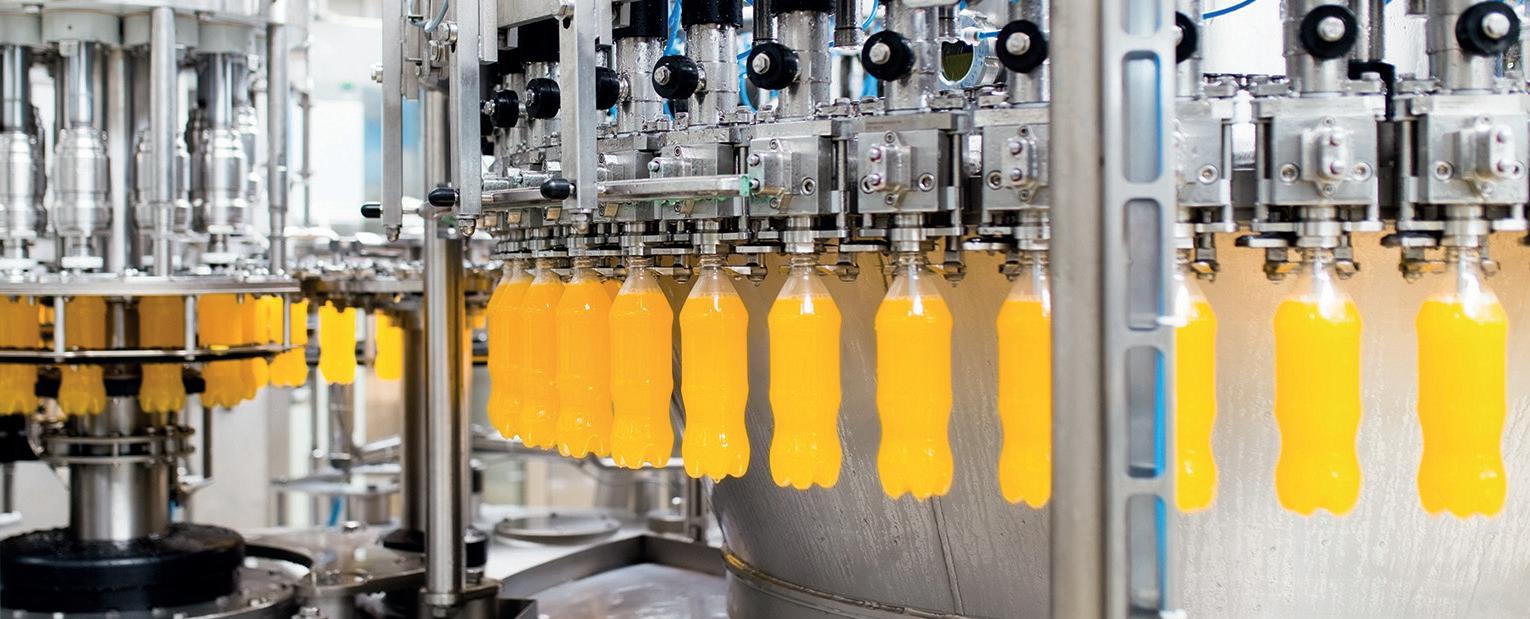
Going forward there will be more exciting and interesting content added to our pages, as well as a newsletter – it’s an exciting time for all here at the magazine and I am looking forward to sharing all our hard work with you over the next issues.
 LH@finelightmediagroup.com
LH@finelightmediagroup.com
Our cover story this month highlights the business of the marvellously named Slutty Vegan - President Jason Crain reveals how it is taking plant-based eating to a new level. Turn to page 22 to learn more.

Please note: The opinions expressed by
and
within this
do
with those of the
and
Every
effort is
to ensure that the
is
and correct at time of
but no legal responsibility for
by the
are
of
can be
by the publisher. All rights reserved. The contents of the
and may not be






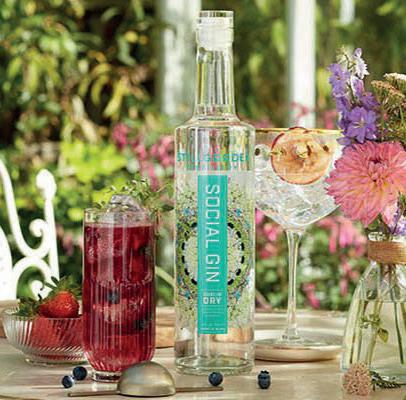



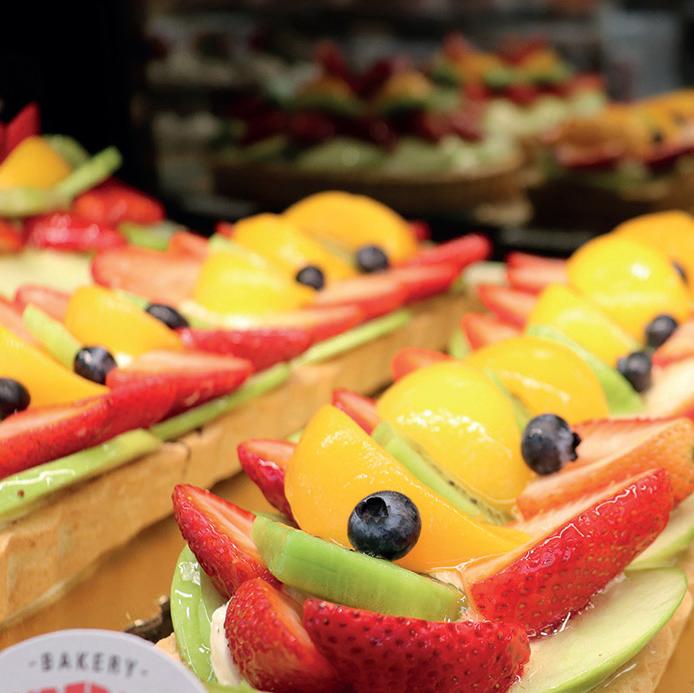
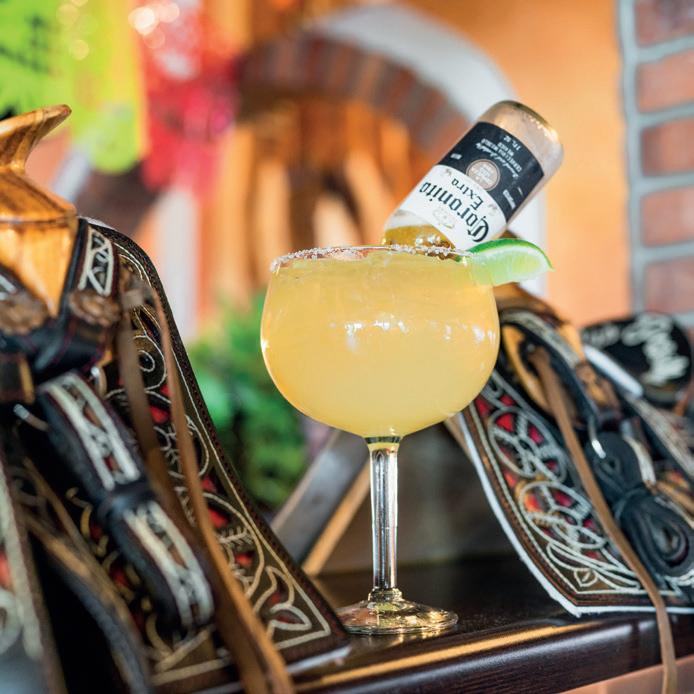
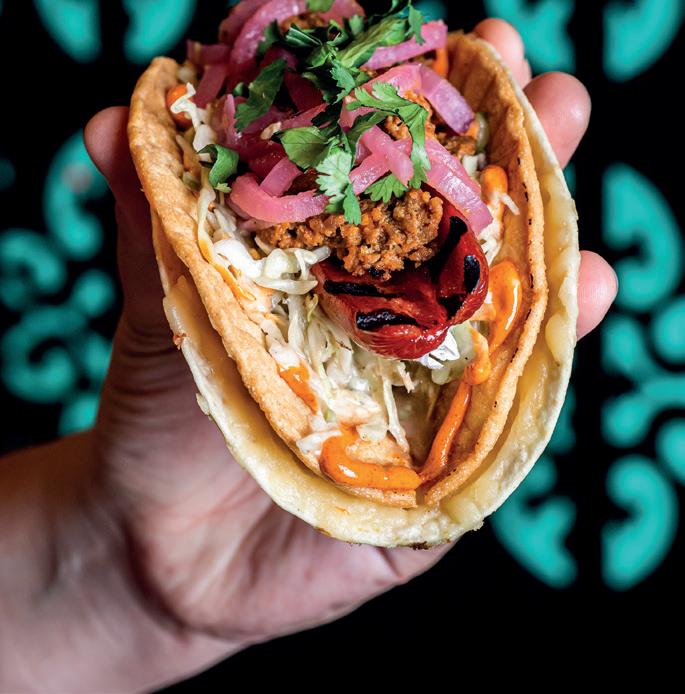



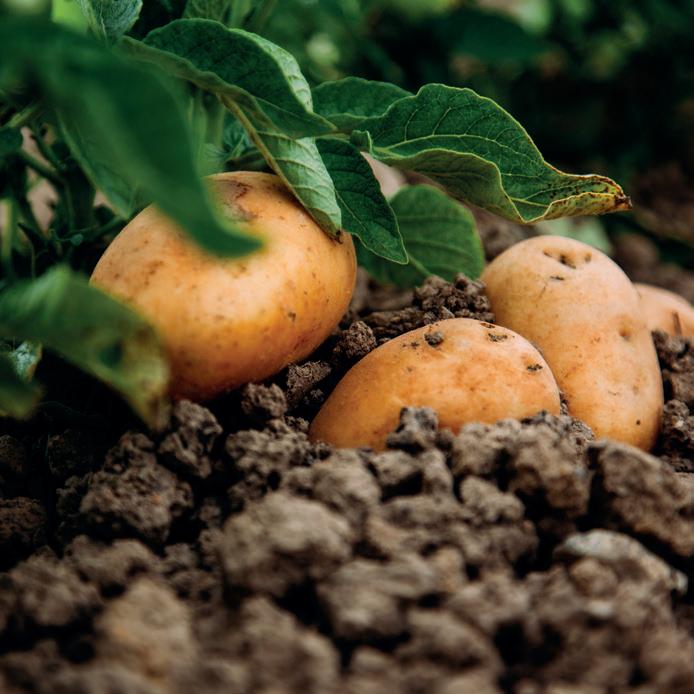


Improving traceability is one of the key challenges for the food industry –integral to improving the sustainability of products and the lives of workers across the globe. What is the edible oils industry doing to increase traceability and transparency in the supply chain?
Gary Lewis, Current President of The National Edible Oil Distributor’s Association’s (NEODA) and Chief Commercial Officer at KTC Edibles explains.
Efforts to improve traceability and sustainability in the oils market have typically focused on forest risk commodities – palm oil and soya. This is because of the real, measurable association unsustainable production has with deforestation, displacement of indigenous communities and threatening endangered species.
Today, the most traceable edible oil is palm oil – as over the last 15 years, huge efforts have been made to develop more traceable, sustainable supply chains. The development of certification schemes such as RSPO has transformed the palm oil market.
Although there is some way to go, more than 71 percent of the UK’s palm oil is now certified sustainable. At KTC, we’ve now switched to 100 percent certified sustainable segregated palm oil –and we expect other companies to follow our lead in the coming years. The progress has been fantastic. It’s a blueprint for change that we now need to look to apply to other edible oil commodities, like soya.
Soya is roughly where palm was a decade ago – with limited transparency in the supply chain, and poor consumer understanding of the issues. Although there are certifications in place, none are as developed or trusted as those associated with palm.
The good news is that things are changing, thanks to initiatives such as The UK Soy Manifesto, a 2021 industry commitment to ensure soy that enters the UK market is sustainable. It generated good engagement, with signatories making up nearly 60 percent of the market – although there are concerns about whether the certification schemes are robust enough to drive meaningful change.
Outside of the forest risk commodities, traceability has been less of a priority. Rapeseed and sunflower are not associated with the destruction of rainforest – so there has been less pressure to provide transparency. This is now changing.
Traditionally, demand for traceability in edible oils has been driven by one of two factors – sustainability, and method of production (e.g. Non-GM and organic).

Now, we’re seeing an increase in brands demanding traceability on social, ethical and political grounds. For instance, with the war in Ukraine, we’ve had customers trying to eliminate all Russian products from their supply chain.
Unfortunately, increasing traceability within the sunflower oil supply chain depends on the crushers – many of whom utilize seed from multiple countries. Providing finished product segregated by country of origin isn’t something they’ve had to think about until now.
So far, crushers have proved reluctant to address the issue - and their focus over the past two years has been firmly on security of supply. As the Ukraine crisis drags on, and supply continues to remain tight, it seems unlikely that this will improve soon.
Supply chain challenges, the war in Ukraine and global price rises have led to a change in focus when it comes to sustainability.
Pre-pandemic, the trend was clear – with a clear increase in demand from customers for traceable, sustainable commodities.
However, the last few years have moved the priorities back to supply. Customers have been more concerned with getting raw materials, and have been prepared to compromise on their commitments in order to meet price points and get products to market.
Thanks to supply chain developments, new technology and looming legislation driving change, traceability in edible oils such as soya is improving all the time. Unfortunately, changes in the global market look set to significantly constrain supply. Demand for sustainable soya already outstrips supply, and there’s a real chance that we may have better traceability… but no supply of sustainable product.
Buying from EU sources is one way of assuring higher sustainability/non-GM – but there simply isn’t enough being produced.
Currently, the growth in soya production is coming from South American countries, such as Brazil and Argentina – but there is little incentive to produce sustainably, thanks to huge demand from Asian countries like China and India.
At the same time, the world’s soya millers often purchase from multiple different countries, making it impossible to trace the origin.
change, especially when it comes to soya.
In the EU, we’re already seeing growers increase planting of non-GM crops in response to growing demand.
Long term, expectations on major food producers to evidence their carbon footprints and Scope 3 (supply chain) emissions will put increasing pressure on the entire supply chain – including crushers, mills and growers to provide a level of traceability that simply doesn’t exist yet in most commodities.
“ “ “ “
Another big issue lies with the growth of the biofuel market, especially in the US. Increasing biofuel mandates (the US requires motor fuels to contain ten percent biofuel), and the emergence of biofuel applications such as SAF (Sustainable Aviation Fuel) are taking up an ever-increasing proportion of US soybean production. All the projections are for this to increase in the coming years.
In the meantime, food businesses looking for traceability and sustainable solutions will inevitably have to pay a premium – as demand outstrips supply.
Balancing the value of this against the cost of solutions in the current environment looks likely to be a real challenge! ■ ...there are more sustainable options available than ever before...
As a result, exports from the world’s leading producer may fall, and users will need to source from elsewhere. The shortfall is likely to be filled by countries such as Brazil and Argentina, where production is contributing to the destruction of rainforest, and the displacement of indigenous peoples.
There is some positive news – there are more sustainable options available than ever before, and traceability in edible oils is improving all the time.
As things stabilize over the coming years, we expect a renewed focus on traceability to force the market into
Gary Lewis www.ktcoilsandfats.co.uk www.neoda.org.ukGary Lewis is President of NEODA and Chief Commercial Officer at KTC Edibles. Founded in 1972, KTC Edibles employs more than 275 people across two UK sites in Wednesbury and Liverpool. The company supplies more than 250m litres of cooking oils to customers of all sizes across the UK food industry each year.
The National Edible Oil Distributor’s (NEODA) key objective is to promote the interests of its members and raise standards across the entire edible oil packing and distributive trade. NEODA’s members include edible oil and fats refiners, processors, distributors and waste oil collectors (who also sell fresh oil). It also covers manufacturers and suppliers of non-oil products (including batter mix, sausages, packaging, potato preservatives) and other industry bodies.

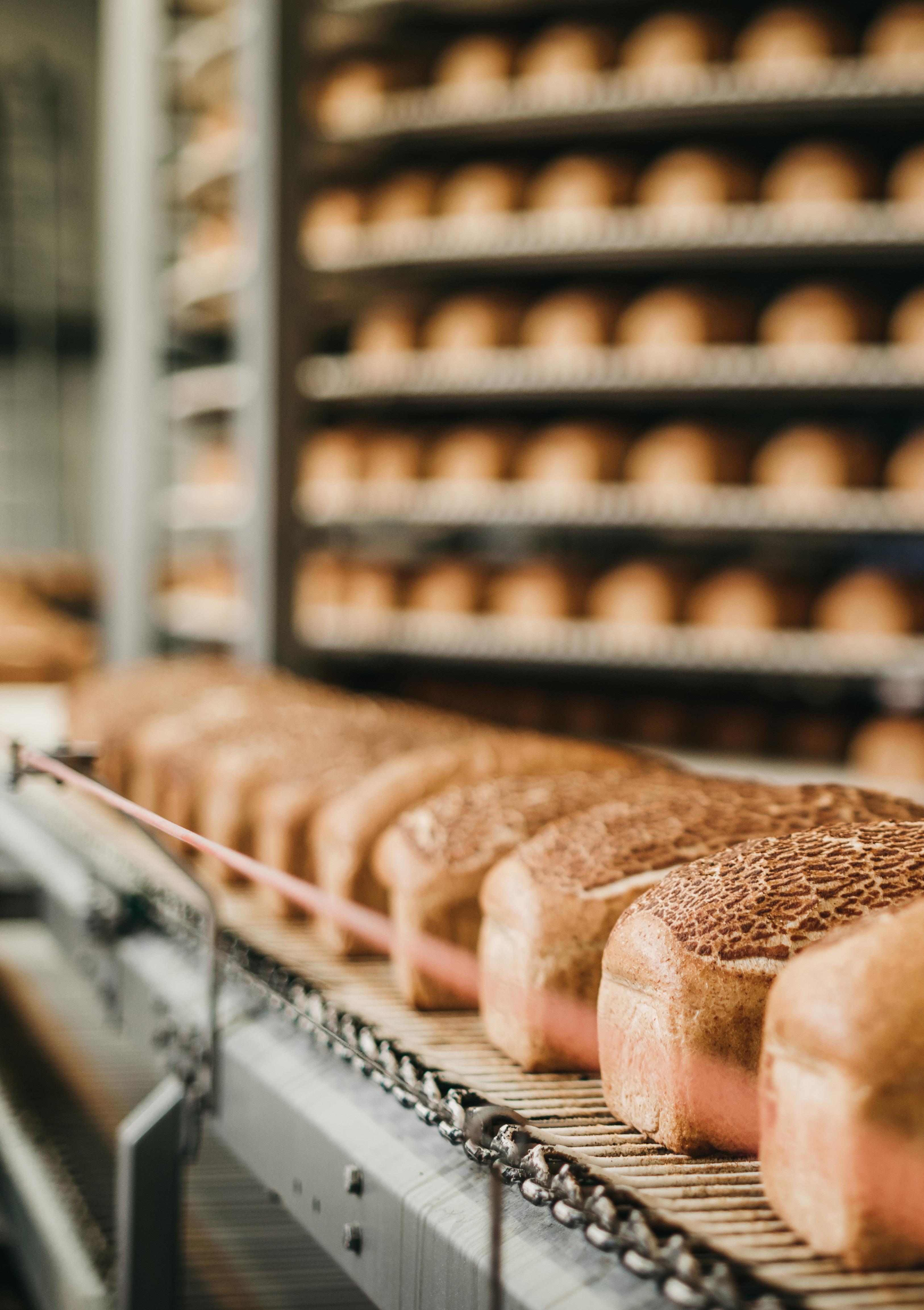
Automation in the food industry: why AI holds the key to future success
Automation technology has been on a path of steady growth for the past few years. Having been predicted as one of the top industry trends for 2022 based on extensive data evidencing its increasing importance in the food sector, it is safe to assume that these newfound solutions are here to stay, and for a reason.
The future of manufacturing revolves around Industry 4.0, and AI is an intrinsic part of how product distribution practices are morphing to make room for machine learning and smart solutions.
Here, Ian Hart, discusses why manufacturers should turn to automation and AI to deal with emerging trends within the food and beverage industry.
The Covid-19 pandemic has undoubtedly accelerated the rise new digital
technologies, and as we emerge from the earlier, more challenging stages of the pandemic, we are faced with a world that relies even more extensively on automation.
Whilst in the midst of the pandemic, companies had to devise ways of coping with staff shortages and unstable work conditions, with safety regulations also affecting the amount of personnel that was able to be in a facility at any given time.
“ “In an era when relying on manual labor has become increasingly more difficult, food manufacturers find themselves in need of modern solutions, which automation technology and AI are able to offer.
By investing in systems capable of carrying out tasks and processes in a consistent and efficient way, manufacturers can rely on processes that are significantly more risk-free while also complying with new, fast-changing regulations and addressing Covid-related concerns such as sanitation.

The procedure of cleaning equipment can be optimized by employing AI...
The Covid-19 pandemic has undoubtedly changed the way individuals think about hygiene, prompting them to consider how and where their food is produced and packaged.
This wave of concern regarding food hygiene was fast-rising regardless of the lack of evidence that the virus could be transmitted through food, rendering new solutions capable of catering to these needs essential.
“Automated procedures can significantly reduce the risk of food-safety hazards, putting consumers’ minds at ease. In the end, we need to think about what’s going to benefit consumers longterm and provide a return, as food hygiene concerns are unlikely to disappear any time soon,” says Ian.
Improving product quality should therefore be a main point of focus for manufacturers, and a significant contributing factor to food safety and compliance is cleaning practices.

Traditional cleaning procedures cannot compete with intelligent systems capable of detecting even the smallest of toxins or contaminants, which can drastically improve product quality.
The procedure of cleaning equipment can be optimized by employing AI, which can be programmed to detect even the smallest of substances that could potentially be harmful to food production lines.
While the increase in production of plant-based food is not a new trend, it is one that is nonetheless on the rise, with demand having more than doubled in value since 2016. Producing plant-based foods requires different procedures to be implemented, particularly when they are produced in the same factory as meat products. By offering efficient and quick quality assurance procedures, automation can cut down on the time that is spent ensuring there is no cross-contamination.
“Manufacturers should cater to the needs of consumers and adapt as quickly as possible”, warns Ian. “For instance, consumers’ commitment to sustainability remains strong in spite of the spike in popularity of packaged food throughout the Covid-19 pandemic, with environment-conscious shoppers now returning to their pre-pandemic habits.
“In this context, rising concerns about food wastage have become relevant again, and AI may just hold the key to developing stable processes to contribute to the sustainability cause,” he continues.
While AI can be programmed to reduce waste and therefore prevent edible food from being disposed of by accident, this technology can be employed to collect useful data and in turn develop algorithms that can consistently prevent waste within a supply chain.
Automation technology can improve the efficiency of overall manufacturing projects in a variety of ways, and open a world of previously inaccessible solutions. As it is paving the way for new routes within the food and beverage industry and beyond, it is not surprising that artificial intelligence is deemed to be the future.
Automated software can provide traceability within the supply chain by collecting and storing data that can be accessed later on by manufacturers to find faults in a system or procedure or identify the source of issues or time delays.
Additionally, AI can operate in environments that could be unfit for humans, such as extremely hot or cold environments, and even contribute to producing food of higher quality by
identifying ideal growing conditions for fresh produce, resulting in better flavor, and thus better products.
Seeking out automation techniques to keep up with demand and changing habits is increasingly more relevant in an era where improving food reliability is essential.
Changing our habits on such short notice requires adaptable solutions, and AI can be programmed to quickly change the way activities or tasks are performed, ultimately providing a great return in investment by allowing manufacturers to adapt more quickly.
It’s vital that manufacturers and businesses seek expert advice to help safely manage operations that incorporate automation technology and AI. With a wealth of experience in the engineering field, adi Group can provide tailored AI and manufacturing systems solutions that efficiently address clients’ needs, no matter how complex or ambitious. ■
Ian Hart www.adiltd.co.ukIan Hart is business development director at adi Projects, a division of renowned engineering firm adi Group. Designing, constructing and self-delivering robust client solutions from over 30 specialist disciplines, the adi Group takes a holistic approach to sustainability, skills and partnership. Consistent, organic growth since its establishment in 1990 has enabled the business to broaden the portfolio of services it offers clients in the Automotive, Food & Beverage, Manufacturing, Aerospace & Defence, Pharmaceutical and Petrochemical sectors.
“ “ ...AI can be programmed to quickly change the way activities or tasks are performed... “ “
Earlier this year, research firm
Coresight conducted exclusive interviews with 219 leading grocery retailers in North America to discuss the issue of food waste. The findings were shocking. A massive 30 percent of all food in the US grocery sector is thrown away – whilst an estimated 50 million Americans will face food insecurity this year. Campaigning group WRAP suggests in the UK, the food waste figure could be even higher at 40 percent.
The retailers estimated that this would lose them a collective $21 billion in net income annually and incur extra costs to the tune of $2.1 billion just to dispose of 40 million tons of waste.
Whilst of course this report is only a snapshot of North America, the issues are global and according to UN estimates a third of the world’s food is either lost in the supply chain or wasted at the retail, food service and household level. That’s about 1.3 billion tons a year.
What needs to change? The Coresight report suggests that retailers in North America are on the right path. Firstly, they are committed to action with nine in ten stating that reducing food waste is important

for reaching their sustainability goals and 72 percent have set sustainability goals specific to food waste. Secondly, they’ve also committed to investing in technology with 84 percent committing budget to waste savings within two years. These technologies include AI-based demand forecasting (stated by 25 percent), electronic shelf labeling (17 percent), RFID tags and active intelligence packaging (15 percent), blockchain (14 percent) and edible coatings to extend product shelf life (ten percent).
What many of these technologies have in common is the ability to isolate products down to an individual item level. Currently, in most cases the tracking of food products through the supply chain and then to the retailer is done either via barcodes or RFID on pallet or container level. Both approaches are tried and tested. They have been the mainstay of the industry for decades and largely effective, but there is an intelligence gap. Barcodes for instance only identify products at a SKU level, it won’t tell the retailer about the age of the products on the shelf. RFID tagging of products
at pallet level is a significant step up from just relying on barcodes. However, individual items will get separated once in store, or in the warehouse in which cases they then become ‘lost’ to the overall system.
This is why tagging at item level is so important. By providing every item with a ‘digital identity’ it becomes a source of data which can be analyzed in a connected product cloud to alert on anomalies and inefficiencies across the supply chain. This can include information about the overdue movement of products at a pallet level or even isolated individual items within a warehouse that are close to perishing or otherwise ‘lost’. Temperature variance alerts can also be introduced, further helping to minimize spoilage and reduce waste.
Legislation is increasingly meaning that the above becomes a necessity. The US Food Safety Modernization Act for instance mandates that it has the right to recall all food products. It also specifies that: “for the first time, importers must verify that their foreign suppliers have adequate preventive controls in place to ensure safety, and FDA will be able to accredit qualified third-party auditors to certify that foreign food facilities are complying with U.S. food safety standards.” Item level tracking makes both processes much easier and quicker. In the event of a critical recall, it’s not hard to envisage how time saved could even impact on lives saved.
Another benefit which will become increasingly important is to capture the carbon impact of the of products, including Scope 3 emissions (which governs the supply chain).
By capturing data from every stage of a product’s journey, from raw material to consumer, this can help firms to demonstrate best practice to consumers. It may also become a legislative
requirement further down the line. The EU ‘Digital Product Passport’ regulation for instance now mandates that consumer goods contain important information about the makeup of each product so that users across the supply chain can reuse it or treat it correctly at waste management facilities. Whilst this doesn’t apply to food yet, a natural extension could (for example) see it extended to food packaging to ensure as much as possible is recycled or re-used.
All firms within the food industry capture data but it often exists in silos where it’s either not actionable or can’t be done quickly enough.
Moving to a mindset of item level tracking with a connected product cloud that acts as a single source of truth means that these silos get broken down and finally firms can make the informed decisions in real-time that can dramatically transform their ability to reduce waste and impact on their bottom line for the benefit of their organization as well as the planet. ■
For a list of the sources used in this article, please contact the editor.
Max Winograd is responsible for leading Avery Dennison’s digital venture atma. io, which has built the world’s leading connected product cloud, enabling any everyday item to have a unique digital identity. In addition, Max oversees product management for Avery Dennison Smartrac. Max joined Avery Dennison in 2017 to launch Avery Dennison’s corporate venture capital (CVC) program and currently serves on the boards of directors of three of Avery Dennison’s CVC portfolio companies.
Max Winograd www.atma.io/solutions
...72 percent have set sustainability goals specific to food waste
Husband & wife (and mum & dad!) duo, Spare Snacks, transform wonky apples into healthy crisps, so the more you snack, the less goes to waste. Made from 100 percent whole fruit, the healthy and affordable range contains no added sugar, salt, fat or oil and a pack counts as one of your five a day.
Alongside its crunchy apple crisp range, Spare has now launched kid-friendly Scrapples Apple, Apple & Mango, and Apple & Strawberry Crisps. Coming in at under 50 calories; they’re high in fiber and mess-free, making them perfect for onthe-go healthy snacking or as a nourishing lunch box treat.

Now rolling out across Morrisons, Ocado, Amazon, BA, Co-Op, Chartwells (school catering) and Brakes
Burts Chips has introduced two flavors of popcorn, adding to its range of flavored snacks. Priding itself on creating only the best hand-cooked and small batch ready-to-eat popcorn, the brand is focusing on building its position in premium bagged snacks. www.burtssnacks.com
Burts’ popcorn offering comes in two flavors; Lightly Salted and Sweet & Salty. “The right amount of pop and a balanced amount of salt means, as a snack, Burts’ popcorn has that moreish quality without overdoing it. Perfect for a healthier on-the-go alternative to crisps,” said our reviewer.

(wholesaler), Scrapples and Spare are resonating with parents and buyers alike. www.scrapples.co.uk
The Taste Test team loved the crisp crunch of the Scrapples, and the apple sweetness that really came through. “A great, healthy snack that fights food waste is a winner in my book!” said one tester. “Sweet, tangy and moreish!” said another. The natural flavor was also highly praised by our reviewer.
Created using only a handful of ingredients, Cocoa Canopy is the only UK drinking chocolate brand to craft fine chocolate beads, for a superior, more intense flavor in every cup, both hot or cold. From decadent Rich Dark to

classic Smooth Milk, the range also includes Salted Caramel, luscious ‘Milk & Dark’ and single origin 70% Ecuador Dark. www.cocoacanopy.co.uk
The team found the chocolate beads created a drink that was ‘indulgent without being overpowering’. “Cocoa Canopy’s milk hot chocolate is a great accompaniment to these cooler months. Best served rich and thick!” said our tester.
Young’s Seafood, the UK’s leading fish and seafood company, has expanded its bestselling premium range with the launch of its Gastro Extra Large Battered Fish Fillets.
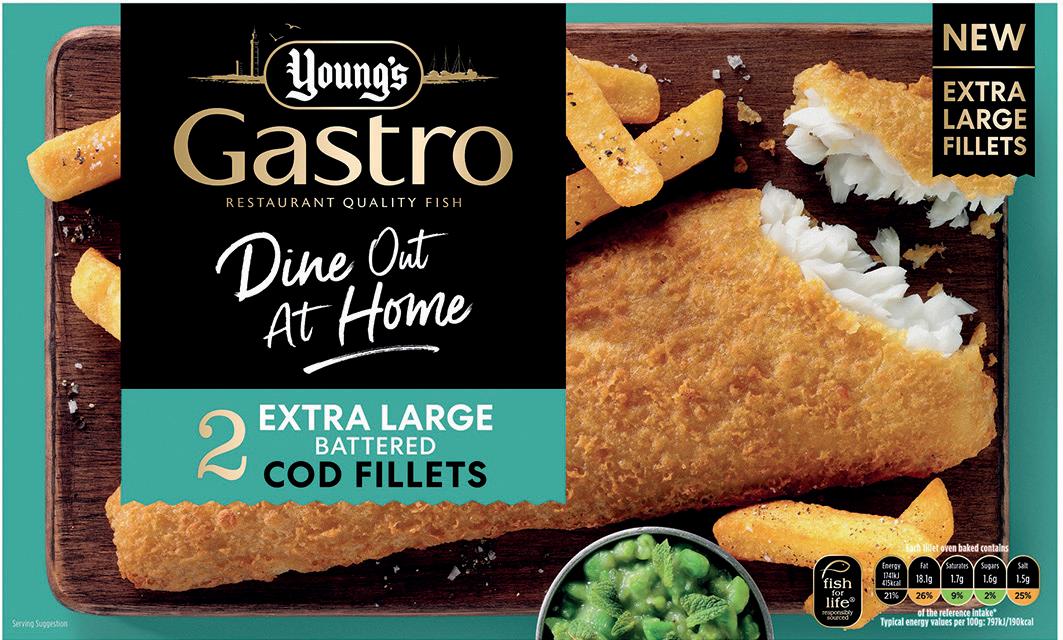
Designed to replicate the generous portions of gastropub fish and chips, the new super-sized battered fillets have been launched in response to shoppers looking for affordable restaurant style products that they can enjoy at home, at a time when 39 percent of consumers are reducing the amount they dine out due to the cost of living.
Available in cod and haddock, the new product launches come after significant growth for the Young’s Gastro brand. Paul Craft, Chief Commercial Officer for Young’s owner, Sofina Europe, says: “Our Gastro brand
The Craft Gin Club has partnered with Soda Folk craft sodas and Stillgarden Gin to create a delicious ‘Blueberry Crumble’ cocktail.
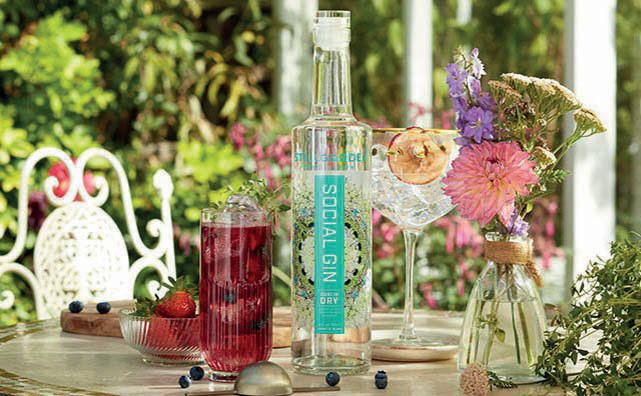
The Craft Gin Club is the UK’s number one gin subscription club, with members receiving a different craft gin each month, alongside perfectly paired tonics, tasty cocktails and sumptuous treats.
Soda Folk craft sodas are inspired by classic American flavors, made with the finest ingredients, and are vegan and gluten free. Utilizing its Blueberry Muffin soda, this tasty collaboration is sure to delight taste buds.
has already brought restaurant quality seafood to the kitchen tables of Britain, and we wanted to expand the range to help consumers find even more delicious options for both midweek meals and weekend occasions.”
Following a successful August launch into Asda, both products launched into Tesco and Sainsbury’s in September.

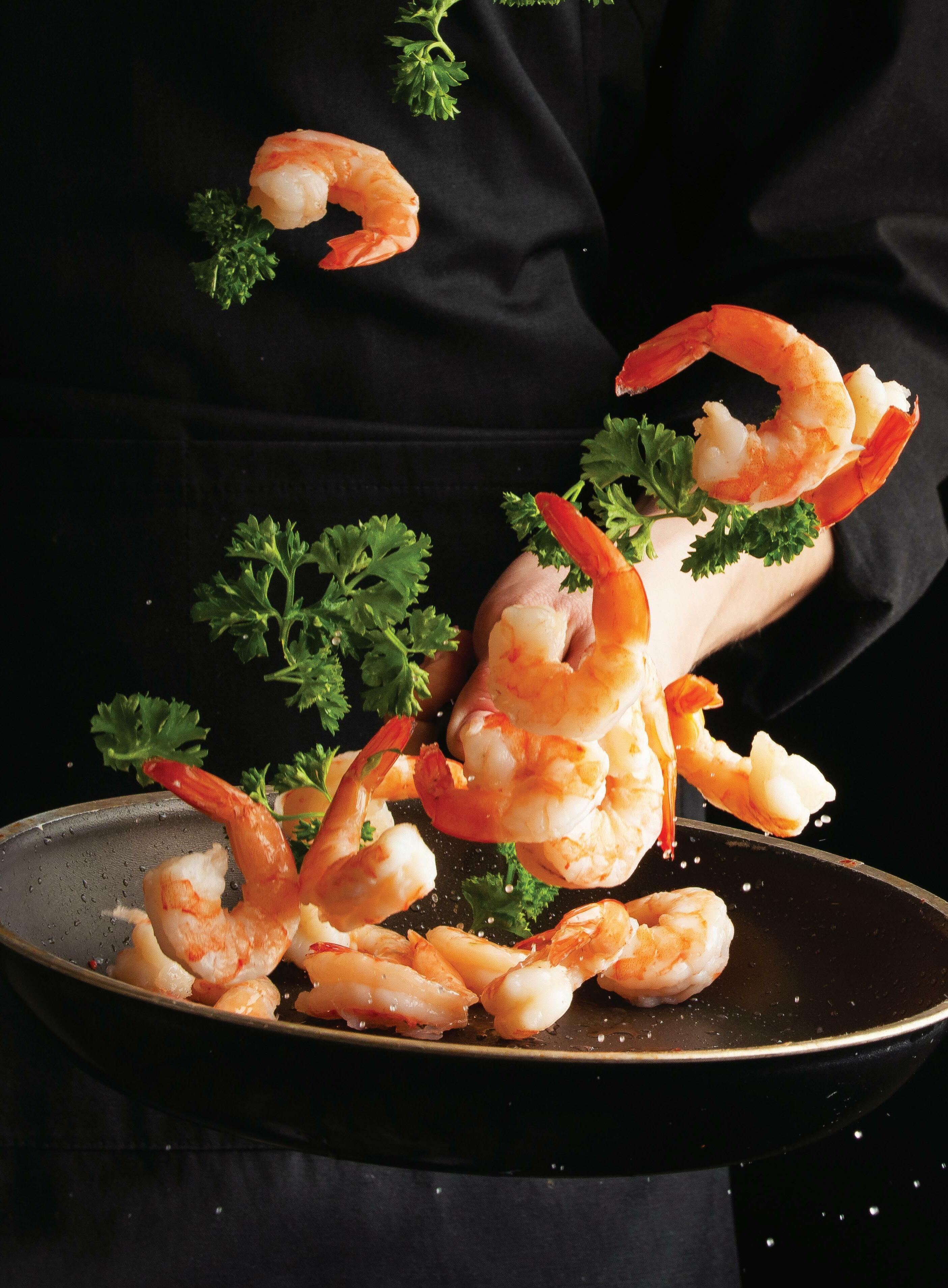
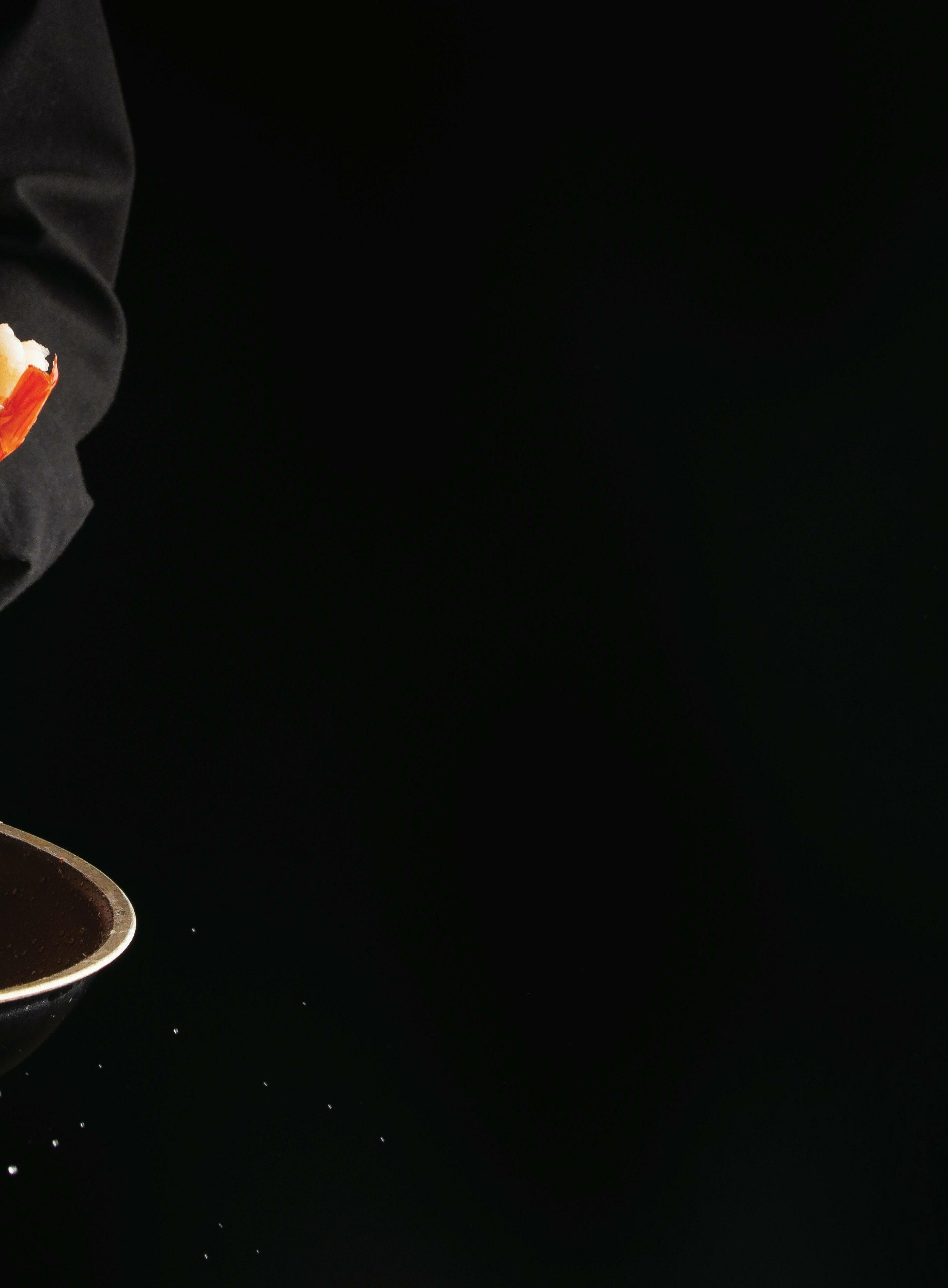
FFD: the commercial distributor serving the likes of PepsiCo and Morrisons


W hen, along with a former business partner, Cory Greenhough launched Fridge Freezer Direct back in 2006, his idea was to sell domestic and commercial refrigeration units online. A mixed customer response, however, led Cory to take the bold decision to abandon the domestic portion of the business, turning his attention solely towards the commercial market. It was a good call. Armed with his IT experience, Cory found the demand needed to propel the business towards impressive growth – a trajectory on which it has continued for the last 16 years.
Now rebranded as FFD, the company supplies mission-critical equipment to a number of key industries. Hospitality, a sector still reeling from the devastating impact of
the Covid-19 pandemic, is among the company’s core markets, but it’s not the only audience in need of refrigeration. As Cory says: “We deal with everybody from the public consumer who wants a cooler for their home bar, through small cafeterias, shops, mini-marts, convenience stores, delicatessens, restaurants, bars, nightclubs, and a whole myriad of public sectors – including the armed forces – to global blue-chip brands, such as PepsiCo.”

This rise is, in part, down to Cory’s pioneering approach, and a commitment to ecommerce in an industry where technological innovation is not always top of the agenda. “Compared to other industries, a lot of the brands, manufacturers and associations are somewhat behind the times,” he concedes. “The pandemic did a huge job of shining a light on that, exposing the distributors & manufacturers that weren’t able to modernise their operations.
“We need to be mindful that ecommerce is a highly competitive market, with a number of distributors selling the same brands.”
How, then, has the group sought to distinguish itself from the field? The answer: a rigorous commitment to customer service.
“We’re transparent and upfront in everything we do,” Cory comments. “If something goes wrong, we’ll put our hands up, own it, and work as hard as
we possibly can to resolve it. We have a dedicated service department, and because we’ve been trading online for nearly two decades, we’ve gained the necessary expertise to know that it’s not just about shifting boxes. It’s about specifying the right product/s for individual customer requirements and creating an experience that, ultimately, brings them back to our door when they need to purchase their next piece of equipment.”
Increasingly crucial to this, is FFD’s ability to help its customers understand the environmental benefits of the products they choose – an area in which there remains plenty of room for improvement. “It often surprises me how little people question us about the energy efficiency of equipment,” Cory reflects. “Even prior to recent energy price increases, the equipment that we sell is not cheap to run, and these details can make a significant difference to our customers’ pockets. For instance, an open fronted chiller is about half as energy efficient as a doored cabinet of the same size. Our role is to educate our customers and help them to understand those benefits. Energy efficiency is a high priority at the moment and indeed will continue to be more so in the future as we all work towards a zerocarbon footprint, so it needs to be top of our priority list.”
Amid the difficulties of Covid-19, it’s been a pivotal couple of years for the FFD Group, and for Cory personally. Towards the end of 2021,
“ “
The team believes that we now have a really solid base to build a growth strategy from
“ “
he took the decision to buy out his partner from the business, before relocating to a brand-new premises. Again, it’s a decision with future growth in mind.
“The size of our new office and warehouse space is four times that of our old location,” he reveals. “With that, comes brand new equipment and internal systems – investments which are designed to make us more robust, and increase our resilience moving forward. As we develop our revenue, it will give us even greater budgets to play with, and the freedom to further invest, improve our processes, products, and support, and welcome bigger and better things.”
Speaking of better things, in February of this year the company welcomed the launch of its new set of websites unifying the FFD brand. A project a long time in the works, and severely impacted by the pandemic, it remains a work in progress. As Cory explains, the team has been hard at work to tackle outstanding issues and iterate its design.
“The whole team has really had to knuckle down and chip away at the problems one by one,” Cory reflects, acknowledging the outstanding contribution of his team. He continues: “It’s made for a tough start to the year, but we’ve certainly kept our cool and remained focused on the issues at hand. I’ve been steering the ship amid both calm and choppy waters, but kudos to the team – they make the business what it is. I can’t understate my gratitude for their efforts.”
Underpinning the decision to launch the new websites, was a desire to integrate the various strands of the


group’s business. This included the original Fridge Freezer Direct website, but also 24/7 Catering Supplies, a catering equipment website, and a further site, established for the sale of grease traps. “Obviously, all these micro-niches are targeting the same customer demographic,” Cory laughs. “If you need a piece of commercial refrigeration, you’ll likely need commercial catering equipment, and grease management of some sorts. We realized we need to pull everything back together under a unified brand, incorporated under FFD. Now, customers can shop across each segment of the business with a single basket. We’re already starting to reap the rewards of the new site/s, and by the end of the year, we expect to have really refined all its elements.”
Looking further into the future, there’s a buzz of optimism throughout FFD, having successfully navigated such an extraordinary period. “The team believes that we now have a really solid base to build a growth strategy from,” Cory insists. “The next step is to bring out our own range of products, including grease management solutions, some steel fabrication catering equipment, and more. It’s nothing we’ve done before, but we’re aiming to begin that in summer of next year. All in all, things are looking very promising. We are financially sound with a solid platform to build upon and I believe it’s going to be onward and upwards from here.” ■
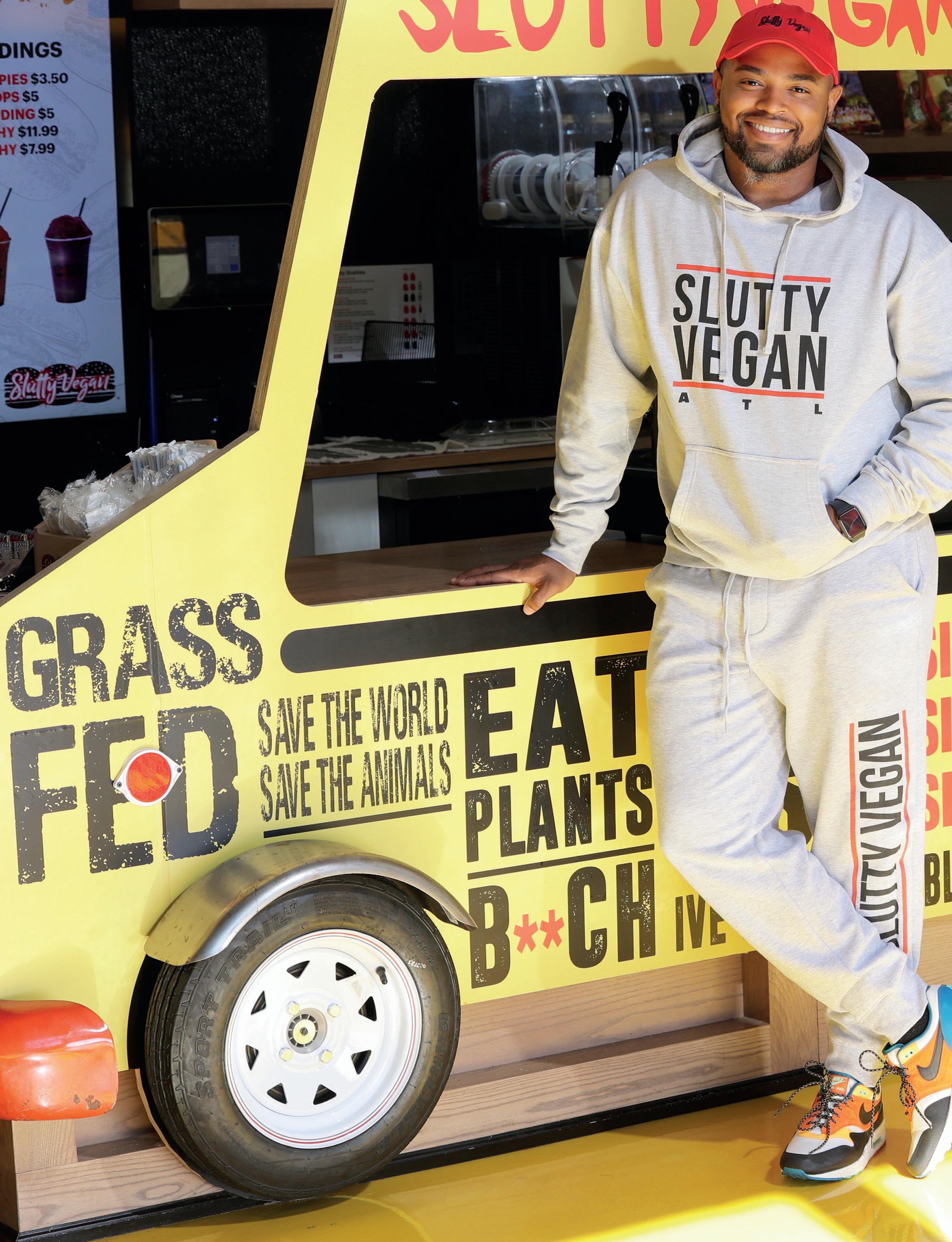
Flipping burgers via Instagram to building a fierce vegan food and lifestyle brand that has collaborated with Steve Madden – the story of how Slutty Vegan is changing the plant-based game for good
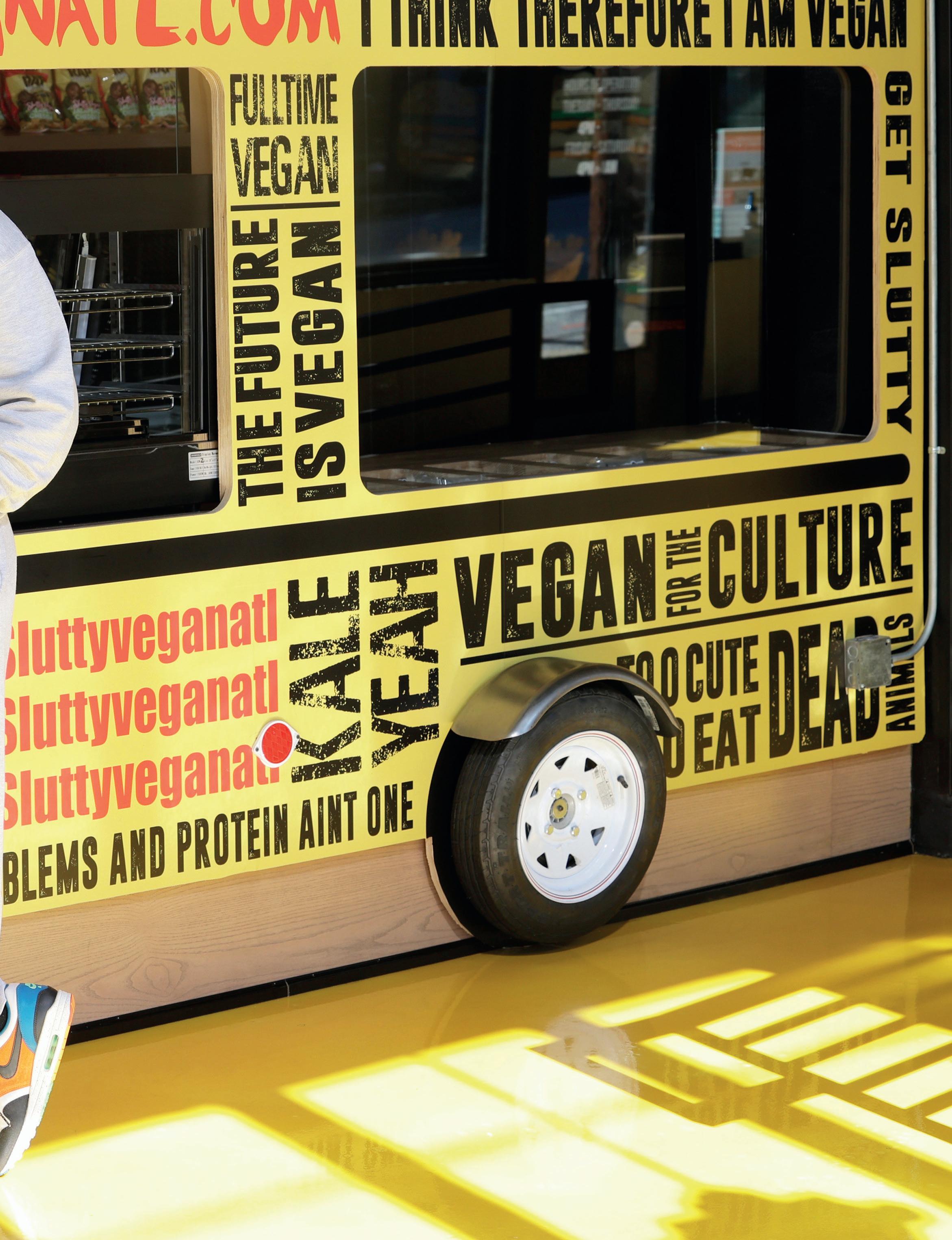 ◀ Jason Crain President at Slutty Vegan
Slutty
◀ Jason Crain President at Slutty Vegan
Slutty

What’s in a name? Jason Crain, President at Slutty Vegan, a plant-based, fast-food burger chain taking the US by storm, breaks it down for FoodChain. “When we speak about Slutty Vegan, you have to understand where the legend comes from,” he begins. “Our founder, Pinky Cole, struggled to find food late at night as a newly turned vegan. There were very limited options, and not much to choose from: salads, maybe; at a push, French fries. So, the origin of Slutty Vegan is about having access to vegan food, which tastes great, no matter what time it is. We are open until one in the morning, and offer incredible late-night options for those following a vegan lifestyle.”
As Jason goes on to explain, the name – as Shakespeare once suggested – is an arbitrary label. The proof is in the proverbial pudding – or burger, for that matter. “In our book, being a slut is not about sex,” he notes. “It is not about being promiscuous or anything like that; rather, it is about choosing to indulge in things that are positive, feel-good, and good for you. If you have experienced our food, then you will realize that these big, sloppy burgers are about recognizing you can indulge in good food while still sticking to your plant-based philosophies and ideals. We were intent on building a vegan brand with some vibes; something very opposite from the typical grass and greenery. We built an experience that feels more like an amusement park than a vegan restaurant with food that’s fun to eat, flavour-filled, and 100 percent plantbased. That’s the Slutty Vegan way.
“From those origins, we have curated a menu that is a little edgy but still tasteful,” Jason details. “In that, I mean we use names people will immediately recognize; however, because of that, we can then change the narrative. For instance, we call all our customers sluts when they walk in.
We might ask you to dance before you get your food. We might give you a birthday chant, or shout out which city you are from, we might even ask you if you are a Slutty Vegan virgin, and if so encourage you to get #SLUTTIFIED!
At Slutty Vegan, being a slut isn’t sexual, it is about being part of a community that understands that even plants can taste good and you can have fun eating them! We are truly a family-friendly establishment.”

In order to prove that, Slutty Vegan recently launched a kids menu, including the ‘Eat Plants Kids Cheeseburger’ and ‘Chik’n Tenders’, and it is proving incredibly popular already. Originally established in Atlanta, Georgia, Slutty Vegan is rolling with the (good) times, and growing with them, too. What started in a home kitchen and the back of a food truck has since snowballed.
With its attentiongrabbing name, engaging marketing, and innovative menu, the fast-food chain now has six different restaurants across Georgia and Alabama. It has also recently opened a landmark store in Brooklyn, New York, and a further location in Columbus, Georgia.
No meat? No problem. Partnering with Impossible, a frontrunner in the meat-free alternatives market, the chain offers over a dozen different burger and hot dog options. For example, the Ménage á Trois is a plantbased patty loaded with vegan bacon, shrimp, and cheese, plus caramelized onions, lettuce, tomato, and a healthy serving of the brand’s signature Slut Sauce – all topped with a vegan Hawaiian bun. Other options include the Big Dawg, a plant-based bratwurst with toppings of sauerkraut and sauce in a pretzel bun; and the innovative PLT: several sweet jerk plantains complemented with lettuce, tomato, and Slut Sauce. All of which come with golden crunchy-fluffy fries.
“We try and make an ordinary burger have some life and become more vibrant,” Jason reveals. “A big part of that is our secret sauce and seasoning: Slut Sauce and Slut Dust. Together, they bring everything up to a whole new level. Additionally, we serve food like vegan banana pudding, coleslaw, and sweet potato pie. It all tastes incredible and people recognize
that, though they are vegan, they can still indulge in the nostalgia of traditional foods because we are offering a meat- and dairy-free alternative.
“Everything we do leads with taste,” he goes on. “If it does not taste good, then it will not reach the menu –let alone our customers. We operate between two pillars: food that tastes great because it is cooked with love and seasoned well; and a unique experience that makes our customers want to come again and again. People walk in our doors and they are instantly met with energy, love, and a plate of food that will turn a bad day into a good one. That is what really brings people back. We also cater to a variety of customers: we launched a non-soy burger and gluten-free option for those with intolerances, and we continue to push limited-time offers to keep things fresh and exciting.”
With a background in technology, Jason is also keen to point towards the importance of data and analytics for any growing business. For Slutty Vegan, technology has been at the core since it was first launched and initially sold its burgers via Instagram. Today, things are slightly different; people no longer need convincing that plant-based alternatives are a viable option.
As Jason explains: “The plantbased market in Atlanta is very vibrant. There are tons of entrepreneurs and restaurateurs that have opened successful vegan and vegetarian places in the city. One of the reasons we chose
People walk in our doors and they are instantly met with energy, love, and a plate of food that will turn a bad day into a good one
“ “ “ “
our initial opening site was because it is in the heart of the west end in downtown Atlanta, which is home to some of the city’s most popular vegan places. We wanted to build on top of that, adding more options for the plantbased community by freshly mixing the old with the new.
“Undoubtedly, the vegan market is growing, and we consider ourselves a leader in that space,” he asserts. “We recently launched a retail division in partnership with Costco to bring our brand from the streets into the family home, bringing us closer to being a household name. The range is doing really well, and includes Pinky’s special dips: spinach and artichoke, hotlanta cheese, and buffalo cheese. We have just launched the range in about 250 Target stores across the South and New York. This is just the start; in the future, we envisage ourselves as a brand that can bring a host of high-quality vegan products like bacon and our signature Slut Dust to grocery stores nationwide.”
Things are certainly looking up. Slutty Vegan expects at least three new openings before the close of 2022, and is planning a further ten along the East Coast next year.

Founder and CEO, Pinky, is also releasing her much-anticipated cookbook in November, which will be widely available across the US. “It is a busy time!” laughs Jason. “But that is what makes it so exciting. Going forward, we intend to become a more familiar brand that offers plant-based foods across the country, whether that means in a restaurant or a grocery store.
“In the next few years, we are also excited to see the rise of Bar Vegan, our upscale cocktail lounge, which will be popping up in additional cities across the country,” he concludes. “Another brand of ours, Dinkies, is leading the way with its vegan cheese steaks and tater tots, and consumers can expect to see more of that name in a range of settings like commercial airports. But we are also keen to continue building ourselves as a lifestyle brand outside of the food space; recent collaborations with Steve Madden and The Lip Bar attest to that. Put simply, you will be seeing, hearing, and tasting a lot more from us in the future!” ■
www.sluttyveganatl.comFrom kitchen table to multimillion pound business: how Belvoir Farm took the UK adult soft drinks market by storm
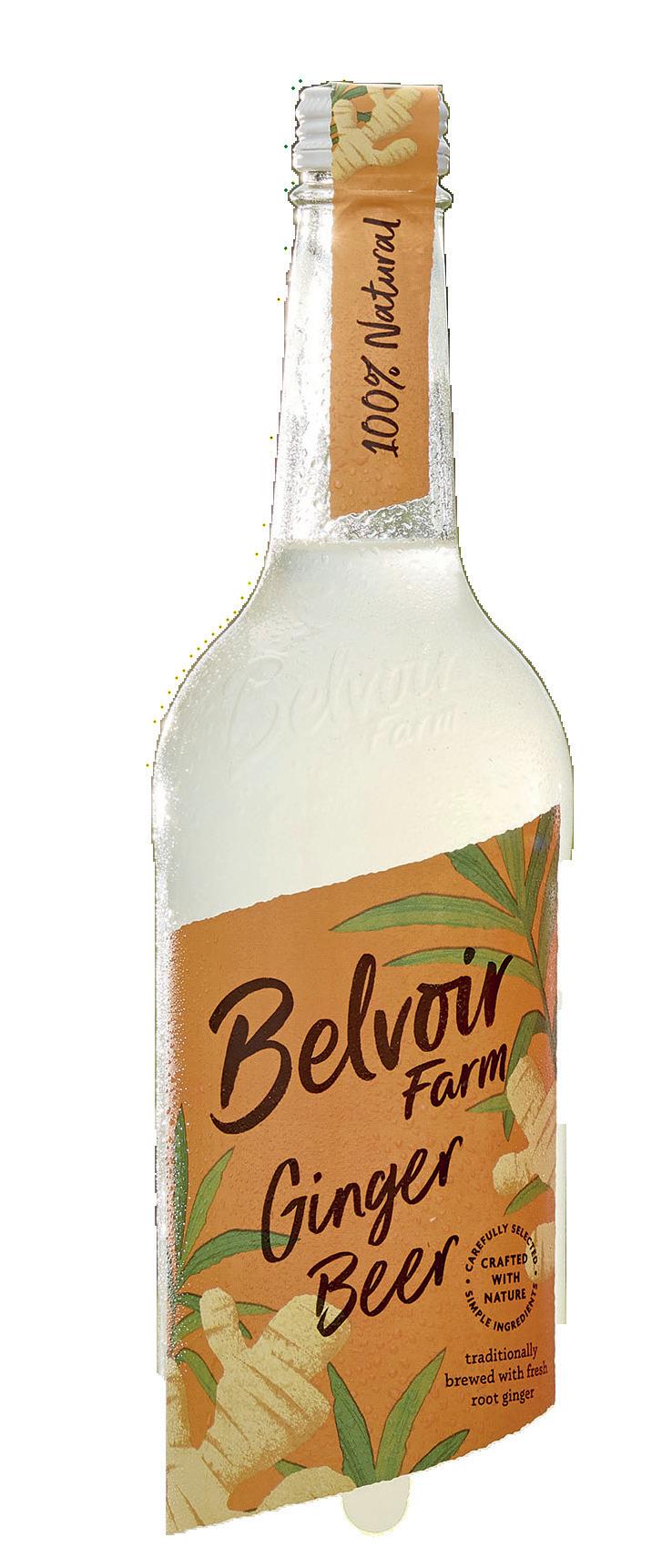
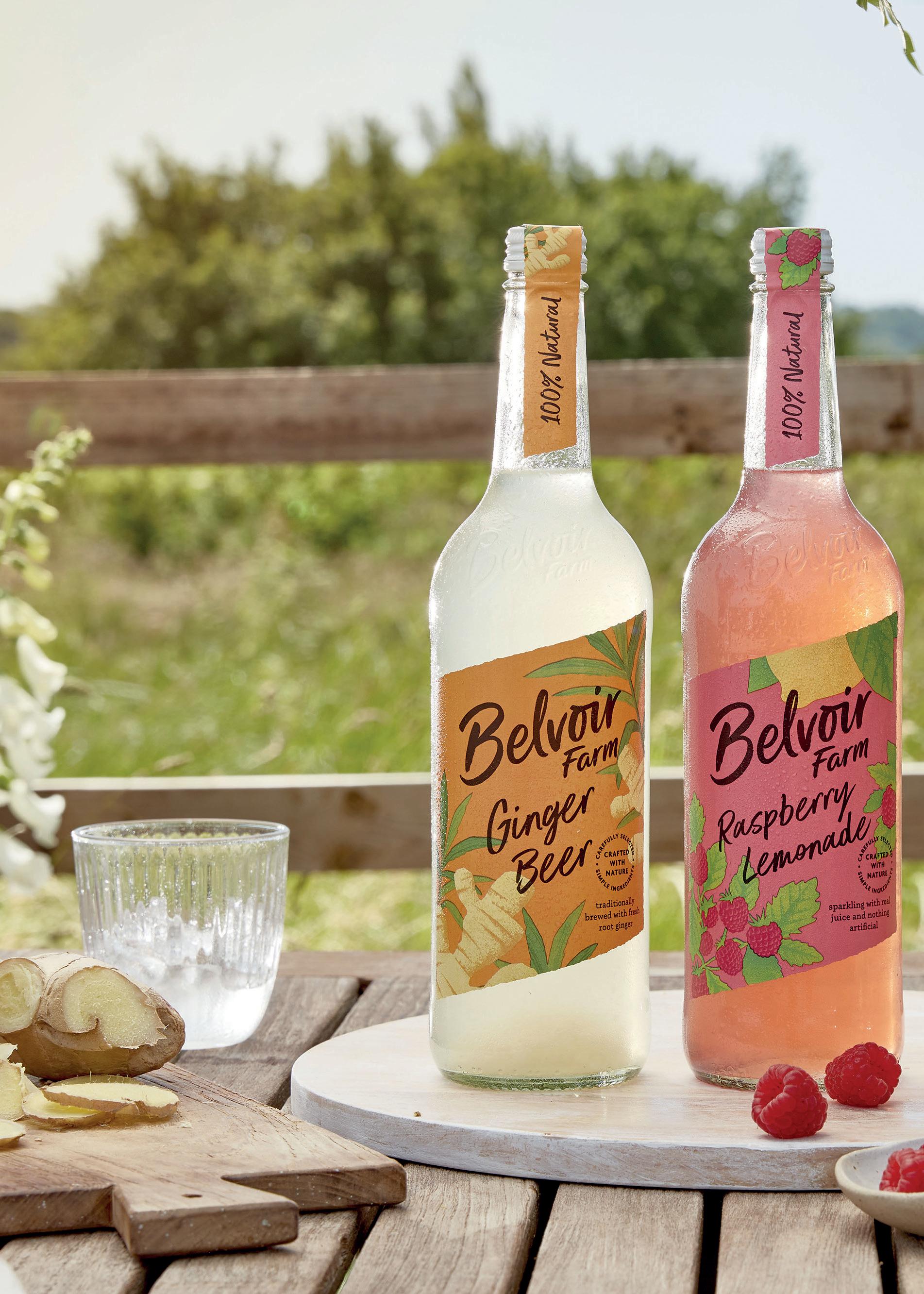
Nature is real. Nature is imperfect. Nature is beautiful. Belvoir Farm (Belvoir) holds these truths to be self-evident.
Tucked away alongside the wild hedgerows between Grantham and Nottingham in the Vale of Belvoir, there is a 2000-plus acre farm and family-owned business that is currently taking the adult soft drinks market by storm. But, first, a lesson in pronunciation.
Following the Battle of Hastings in 1066, so the story goes, a Frenchman stood atop a hill in what we now know as the Vale of Belvoir and said the following: Quelle belle voir! Or: What a beautiful view! However, over the next hundred years, French names were anglicized to reinstate English authority.
As a result, Belvoir is now (technically) pronounced beaver – just like the animal. Either way, though, the curious part of all this is that nature is inextricably bound up in the meaning of the word. And that is something crucial to the brand that bears its name.
Proud to include no artificial preservatives, flavourings, colourings, or sweeteners across its impressive range of cordials, sparkling juices, and botanical sodas, Belvoir is family-owned and run –and it is quickly approaching its 40th anniversary.
Established as only a mildly successful fruit farm by Lord and Lady John Manners in 1984, it was soon clear that something had to change to keep the business viable. Therefore, when harvest season came around, the Manners decided to press any unsold fruit into juice and make some cordials with it – all by themselves. And it tasted good. Really good.

As Frank Fitzgibbons, Production Director at Belvoir, tells Food Chain, that is the basis for everything customers now know and love about the brand. Perhaps most famous for its elderflower cordial, Belvoir has upscaled its operations dramatically to meet growing demand.

Originally taking place on the Manners’ kitchen table, says Frank, Belvoir soon moved into an upgraded but still relatively small facility. It was very labour intensive and manual, often relying on the local public to come and pick the elderflower at harvest time. “The business sold just over 1000 bottles to local food stores and farm shops in its first year,” he explains. “By the time I joined in 2003, production had grown to two million bottles every year, and that has just skyrocketed over the years. Last year, for instance, gross sales rose to £27 million. We are now producing 22 million bottles annually.
“We have a very well-automated site and are constantly investing in the business,” Frank goes on. “In 2015, we established a new, purpose-built
. . .We continue to do so today. One example of that is our sixty-head filler machine, which was purchased in 2019 and has improved our line speed and throughput by 40 percent
“ “ “ “
factory to create capacity and enable us to meet the increasing demand for our products. Since then, we have invested heavily in modern filling and capping machinery, packing equipment, and processing kit for our juices and elderflower infusions. Back in 2008, we really had to start investing – and quickly. The business was starting to grow exponentially in terms of distribution, and thus we had to begin integrating sophisticated technology into our processes. We continue to do so today. One example of that is our sixty-head filler machine, which was purchased in 2019 and has improved our line speed and throughput by 40 percent.”
Despite the monumental surge in production demands, little has changed in terms of the recipe. To this day, Belvoir still follows the original one used by the Manners in 1984. As the saying goes: if it is not broken…
“Even with that continuity, we have still increased our range of products alongside company growth,” reveals Frank. “Stock Keeping Units (SKUs) have increased steadily since we started, and while we are still very much an elderflower-based business, we do also sell other juice-based products in tandem. Several years ago, for example, we created a sparkling raspberry lemonade, and that has proved very popular. We also love ginger! We produce delicious ginger cordials and ginger beer, and also often look towards the seasons. That means summer punch or citrus drinks when it is warm, and winter cordials or berry punch mixes when it is cold.

“Above all, though, we pride ourselves on quality,” he adds. “We source real, natural ingredients. We do not cut back on them. It is all about what we source, how we source it, and then, of course, how we produce it. Though our bottling processes are now

automated and upscaled to meet volume demands, we make the liquid using very simple techniques to maintain the integrity of our ingredients and keep them as natural as we can. The elderflower, for instance, is made with fresh flowers picked that day in the local community and from our own 60-acre organic plantations, and we do very little with it apart from infuse it with water, sugar, citric acid and lemon juice and let nature’s magic take its course.”
For this decidedly simple approach to crafting adult soft drinks, Belvoir has garnered a lot of attention from the critics. Earlier this year, for instance, the company was named 2022 Soft Drinks Brand of the Year by The Grocer Gold Awards. Moreover, in the last ten years alone, Belvoir has received 21 Great Taste awards and another 4 this year.
Yet all that recognition and plaudits has not made the Leicestershire-based company complacent. “New product development is very important to us,” asserts Frank. “Recently, we launched a range of botanicals, which was spearheaded by our in-house innovation team. In terms of size, the team is relatively small. However, as a unit, it works incredibly hard to find and source new and exciting ingredients. As a result, we have been able to continue our success outside of elderflower cordials, and we are seeing strong interest in these new botanicals. In fact, we have gained some key distribution contracts and awards recognition based on their flavour alone!



“We are very adept at launching new items, such as sparkling juices or botanical creations, and are proficient in getting them to market quickly,” he continues. “We pride ourselves on the transition from initial concept to end product; we are able to act quickly and maintain high standards throughout. Saying that, though, if we do not have it right then we will not rush it –again, quality and taste come above all else.”

As a brand, Belvoir is also insistent that it maintains standards for ethics and sustainability. For Frank, the fact that Belvoir’s roots are as a farming business, and therefore bound to the environment around it, must inform decisions the brand makes when it comes to its place in relation to the living world.




“Over our 2000-plus acres of arable land, we have planted thousands of trees and new hedgerows, installed bird boxes, we grow land just for winter bird feed and we set up beehives,” he reflects. “It is all about being genuine and caring for the environment. To that end, we joined forces with Certified Sustainable and Carbon Quota. Together, they measure our activities with regards to sustainability, and how we interact with the local environment.”
Since 2018, Belvoir has reduced its carbon emissions by 36 percent – a figure
that has been independently validated by Carbon Quota. More recently, the company was awarded a top tier Gold Award from Certified Sustainable, demonstrating that the soft drinks producer has practiced good waste management.
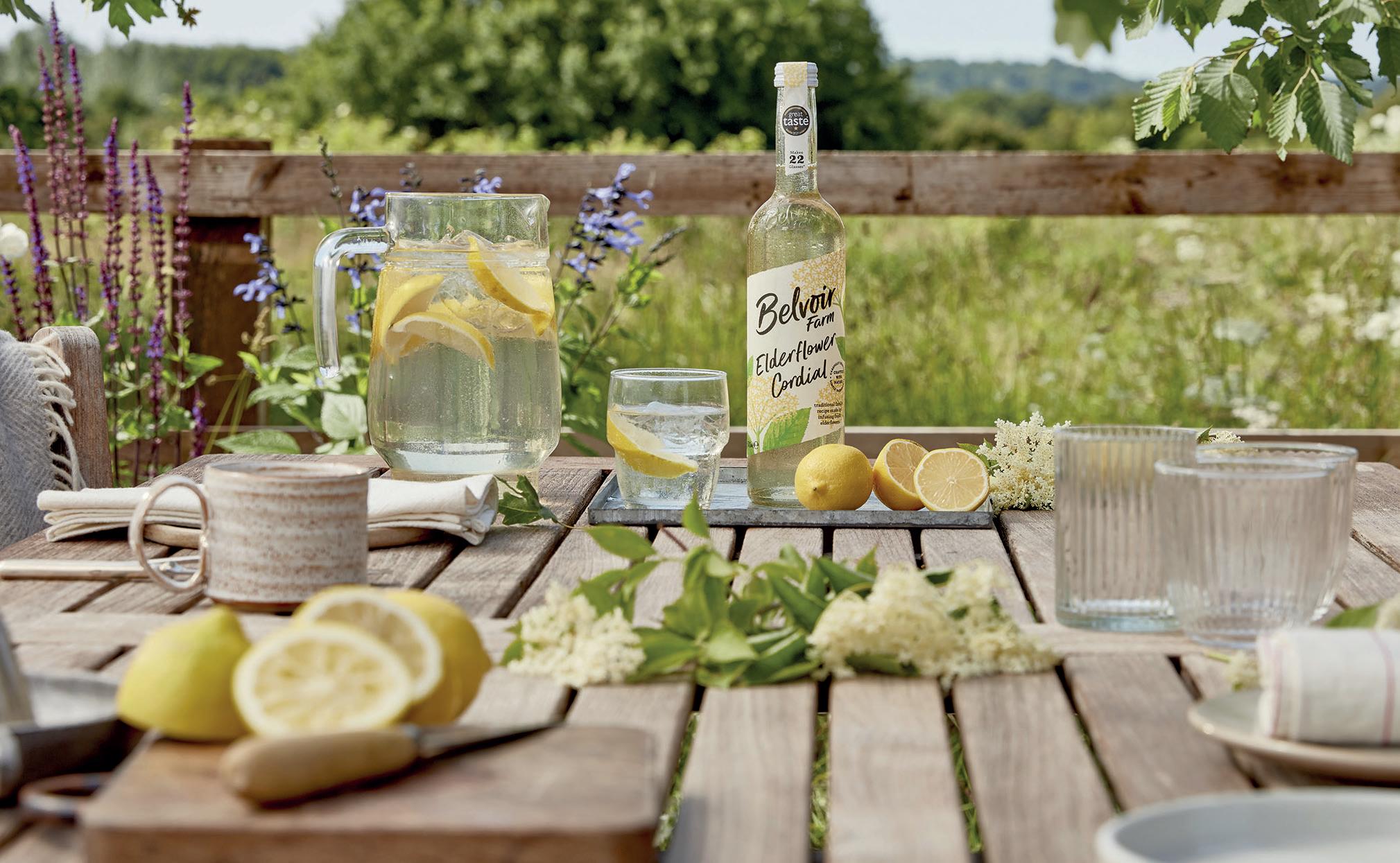
“For a company of our size, we think that is terrific, and it motivates us to work even harder towards our ambition of becoming carbon neutral by 2030,” details Frank. “We are now zero waste to landfill too, and have been for more than a year. Other initiatives helping us on our environmental mission include the installation of solar panels across our main site and the planting of 28 acres of wildflower and 10,000 trees through the Countryside Stewardship Scheme.”
Recently, Belvoir has been exploring the value of television advertising, leading a campaign to show its commitment to everything we have talked about thus far;
from high-quality ingredients to sustainable production methods, the company intends to expand and amplify its ethical framework going forward.
“We are currently in the process of putting together a new three-year business plan that takes into account the current economic climate and global situation,” notes Frank. “So, the goal is to continue doing what we are good at; producing quality adult soft drinks with integrity while also introducing new ideas to the market.
“We want to become a leader in our field – not a follower,” he concludes. “We are very proud of what we do, and we are hoping to keep that momentum going in difficult times. The headwinds are challenging. However, we have a steady crew and the ship is sailing in the right direction.”


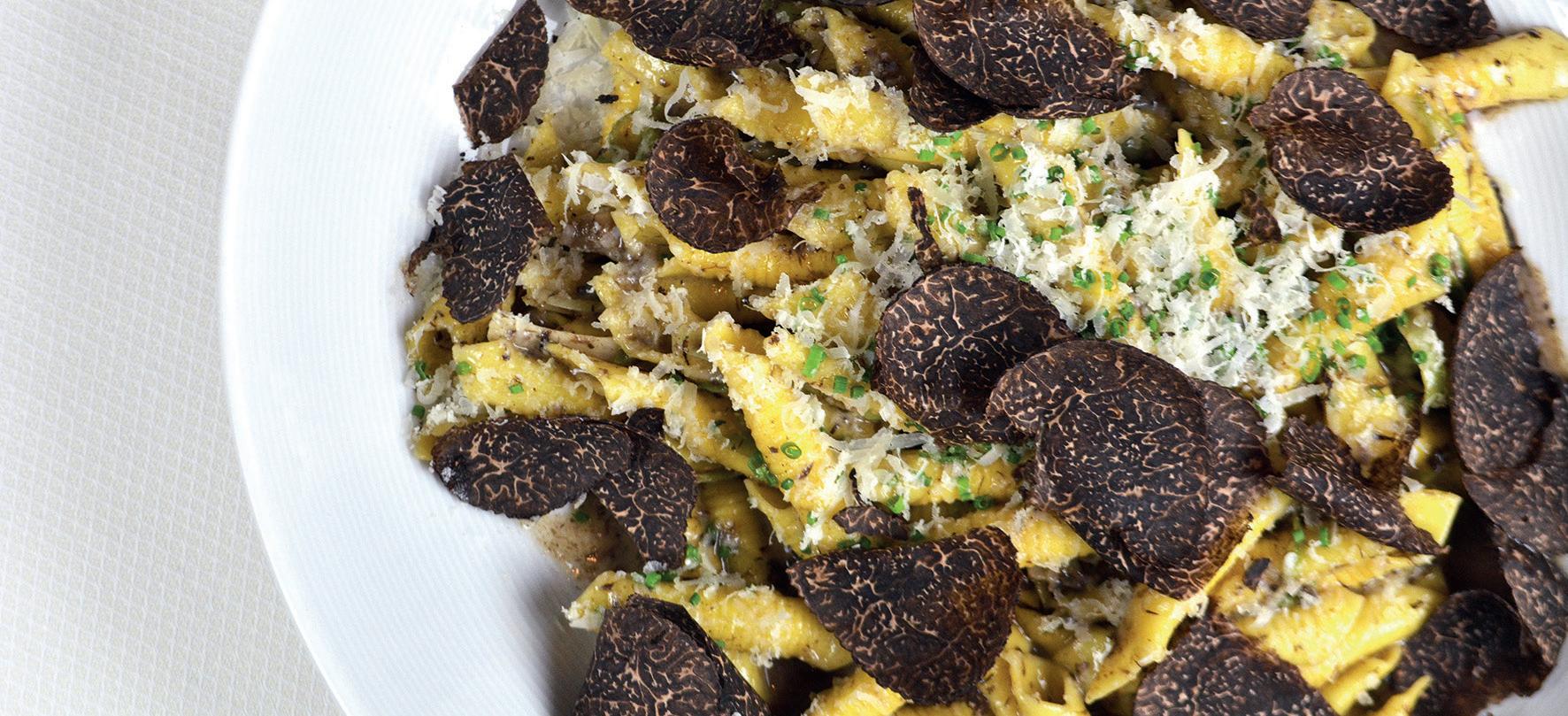
The Altamarea Group (Altamarea) is driven by a simple pursuit: crafting incredible dining experiences which ensure consistency and excellence at all levels. As a result, its restaurants have been recognized by the New York Times, the Michelin Guide, the James Beard Foundation, Zagat, and many more.
Currently, Altamarea operates 20 restaurants around the world. Senior Vice President, Susan Lee, recently sat down with Food Chain to discuss the brand’s rise, new restaurants, and a promising future.
But first, a little context. Altamarea was founded in 2009 by Ahmass Fakahany, whose mission was to

create an experience that extends beyond food and beverage. Since then, the company has propelled the luxury Italian dining scene in New York City, with a beloved following and dedicated team of industry professionals leading the way.
Altamarea’s flagship restaurant, Marea, is one of the busiest of its kind in the city – perhaps on the East Coast. It was, like the rest of the company’s portfolio, built upon a vision to create distinct restaurant brands that offer outstanding service and unsurpassed quality. At Marea, diners can expect a variety of dishes, ranging from caviar and oysters to seasonal antipasti and award-winning hand-made pastas.
An insider’s guide to the Altamarea Group and its mouthwatering collection of fine dining establishments
It is worth pausing on the latter. One of Marea’s signature dishes – a red wine-braised octopus and bone marrow fusilli – has a cult following. Another dish, the seasonally driven quadrotti, is filled with sweet summer corn and finished with chantarelles and shaved black truffle. The menu is also composed of fish dishes, whole fish preparations, as well as a selection of meats and sides. Think pan-seared dover sole, 50-day dryaged beef ribeye, and confit potatoes. There is something for everyone.
“Marea welcomes around 2000 guests a week, the brand loyalty is truly remarkable,” admits Susan. “The restaurant stands out from the competition, particularly within the high-end Italian fine dining scene. Location is certainly a key factor – Central Park is beautiful, and the visibility for Marea continues to draw crowds. The food, wine, overall quality, and rigorous attention to detail heightens the entire experience. All the pasta is made in-house; extruded, hand cut, and shaped and filled every day. It is quite laborious, but of course worth it. There are at least two-tothree people preparing pasta as their sole job, because it’s such a key part of the restaurant experience. They are invaluable team members, and you can see the pride they have in their craft.
“Beyond Marea, we expanded to Ai Fiori and Morini, which are both very popular,” she adds. “In fact, we have
multiple fronts of Morini in New Jersey, Washington, D.C., Long Island, and Miami Beach. More recently, however, we’ve been able to expand abroad, with a Marea location in Dubai, and Morini in Istanbul and Riyadh.”
With all those options, which is Susan’s favorite? “That’s like asking a parent to pick their favorite child,” she laughs. “I don’t know if I have an answer for that! I love them all – but if I am going to Marea, then I am definitely going for the crudi assortment (sliced raw fish and shellfish) and all the seafood. Whereas, at Ai Fiori, I am obsessed with the trofie nero. I’ve loved it for over 12
years since I first worked for the group. Still, I go back for more! The desserts there are phenomenal, worth the trip just for that. When I go to Morini, I have to have the black truffle ricotta cappelletti with prosciutto, it’s a signature dish. Also, the olive oil cakes! They are so delicious! I sometimes sneak one out even though I don’t need any more carbs in my life.”

Despite its success and recognition within the Italian fine dining niche, Altamarea has demonstrated a commercial and personal ebullience for variety, spreading its wings with the opening of 53 earlier on in 2022. Situated on 53 West 53rd Street in Manhattan, the restaurant has been built on a contemporary Asian dining concept. The new location
When I go to Morini, I have to have the black truffle ricotta cappelletti with prosciutto, it’s a signature dish
“ “
“ “
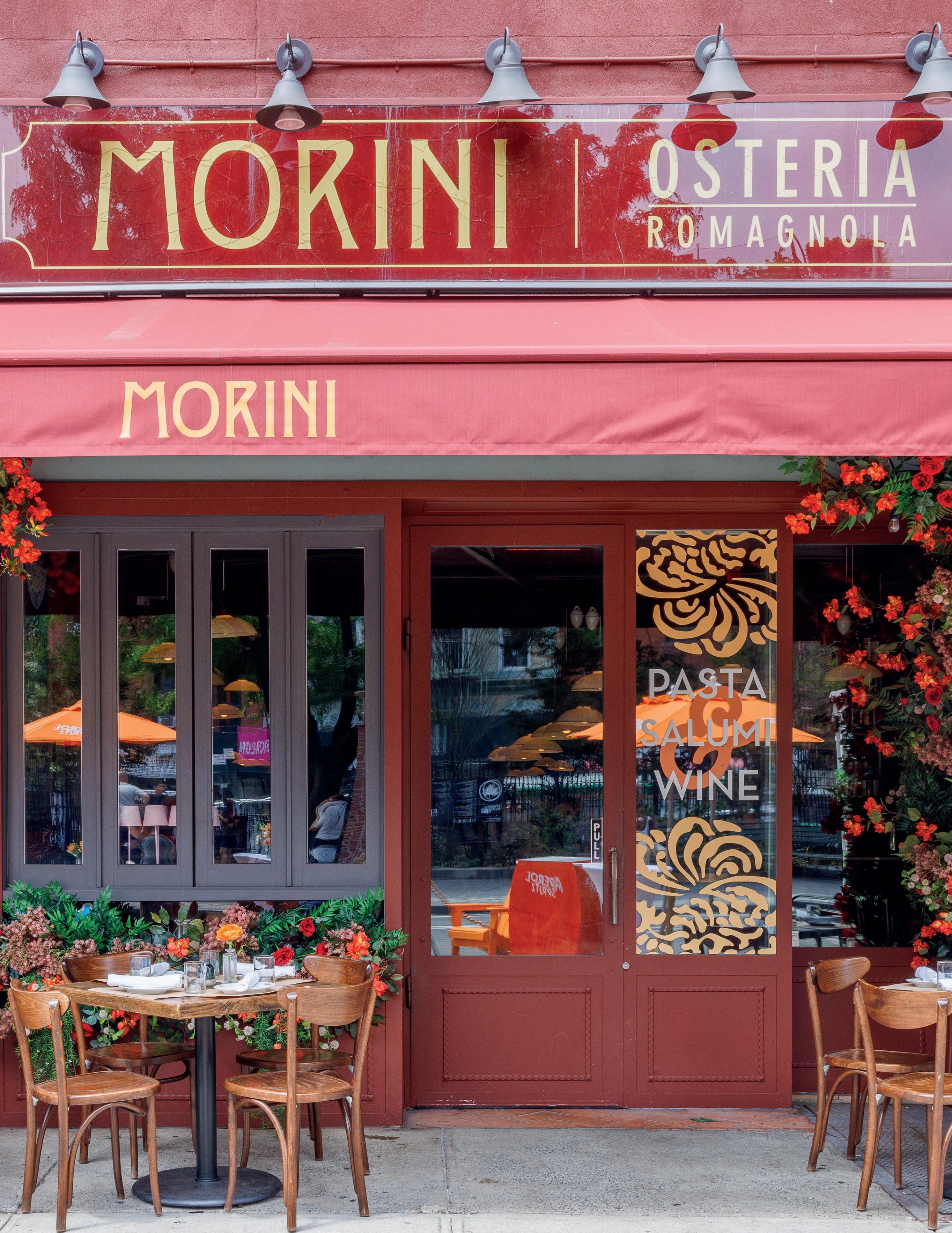
can be found next to the Museum of Modern Art and sits within the Jean Nouvel Luxury Residential Tower. Diners can expect a focus on Cantonese, Singaporean, and Japanese influences and ingredients, which runs the gamut from fluke kombujime, to truffle xiao long bao, kung pao quail, and lobster rice in lotus leaf.
Staying ahead of the game and continuing to diversify through fresh and bold takes on contemporary dining
experiences is part of what makes Altamarea stand out from other restaurant groups. The immediate hit that 53 has been attests to this. But where does the group draw inspiration from: diners or the market?

“I think it has to be a little bit of both,” answers Susan. “You obviously must pay attention to what the client wants, and if you are blind to that then you probably won’t be in business for very long. Listening and responding to our clients is a priority;



we seek to give them what they want, we always consider the desires of our clients and the market trends while staying true to our culinary integrity.
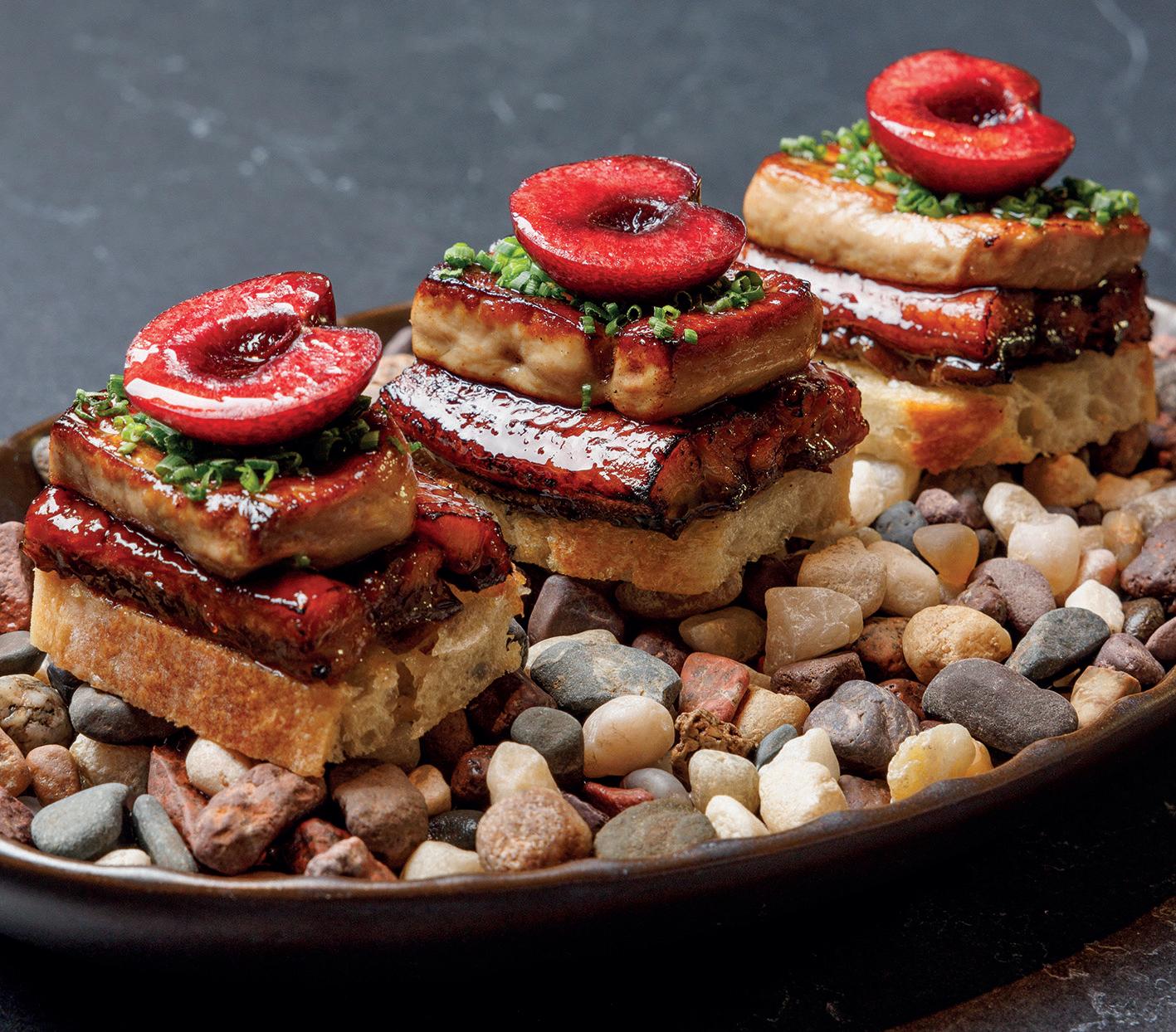

“At the end of the day, we’re in the business of saying yes,” she continues. “Ahmass is 100 percent client-focused. We’re firm believers that you are only as good as the opinion held by the last person you served; you are only as good as the last dish you put out. Everybody in the executive team is dedicated to this sentiment. We’re all industry veterans; everyone has been doing this for 20-plus years, and we would not still be here if we did not love it. We also embrace that we are in the service of people; if you do not have that in your blood then this is probably the wrong business for you.”
Not everything has been smooth sailing, though. As Susan details, the last two years have been fraught with a host of challenges brought on by the pandemic. For instance, before the arrival of Covid-19, machine orders might have taken a week or two. Now, lead times can take as long as eight months.
In fact, one stove top plancha took ten months to arrive at one of Altamarea’s restaurants, which has forced the group to be ever more dynamic in its approach to
procurement and logistics. “The biggest challenge, however, is the current labor shortage New York City is experiencing,” Susan reflects. “We lost about 250,000 industry people during the pandemic and only about 80 percent of them have returned. So, we are dealing with an industry that has been crippled by Covid-19 in more ways than we can count. Hopefully, people will start coming back in numbers as we head into the fall.
“However, on the whole, I think we are on a good trajectory,” she concludes. “We don’t like to rush innovation or expansion. Instead, we like to pay attention to what is happening right in front of us. I would like to see some growth in our executive team over the coming years because we did shrink quite a bit, adding a couple of key players here and there. But really, we want to maintain our focus and keep it consistent. In the end, that is how you organically grow a business and then who knows. If Ahmass wants to do another 53 opening down the line because it is so popular, then I am game for anything. At the end of the day, we think about growth in a holistic fashion and that is both assuring and exciting, because we’re all about good food, good drink and good company.” ■
Why the Ramirez Hospitality Group successfully brought Mexican cuisine to the States

There is a Mexican proverb that goes ‘Barriga llena, corazón contento’, which translates to ‘full stomach, happy heart’. This is what you can expect when you visit a restaurant under Ramirez Hospitality Group’s umbrella. The family that owns the business believes in the vision of Jose Ramirez, who brought to life his version of the American dream.

This year, the business celebrates 20 years of that vision. “We have the option for our team to work short-term of course, but Ramirez Hospitality Group really wants to bring out the long-term, the longevity, to make this industry one in which careers are established,” begins Daniel Ramirez. “The restaurant industry can be incredibly rewarding; we have had so many great employees work with us for nearly 17 years,” he says. For him and his brother, Luis Ramirez, who are Co-CEO’s, the essence of the Ramirez Hospitality Group rests in providing the tools for its employees to open their own restaurant or kickstart their own career in the hospitality industry. “We want to be able to bless them, and let them be the best version of themselves, not only with us, but wherever they want to go personally and professionally,” says Luis.
The two wanted to recreate the feeling of experiencing their father, Jose Ramirez’ hometown. Jose worked as a server at Las Palmas, working 60 to 70 hours per week, eventually becoming the Server Manager. Jose saved up

One night in Mexico, that is what customers can expect from a visit to one of the Ramirez Hospitality Group’s locations
“ “ “ “
enough money to open the first Los Dos Potrillos location in Centennial in 2002, and, having invested everything he had into his restaurant, Jose told the first customers of Los Dos that if they didn’t like the food, he would buy it for them.
Now, with four locations in Centennial, Littleton, Highlands Ranch, Parker, and a fifth on the way, Los Dos Potrillos provides customers in the South Metro area with traditional Mexican food, while maintaining a family-friendly experience thanks to years of hard work by the Ramirez family.
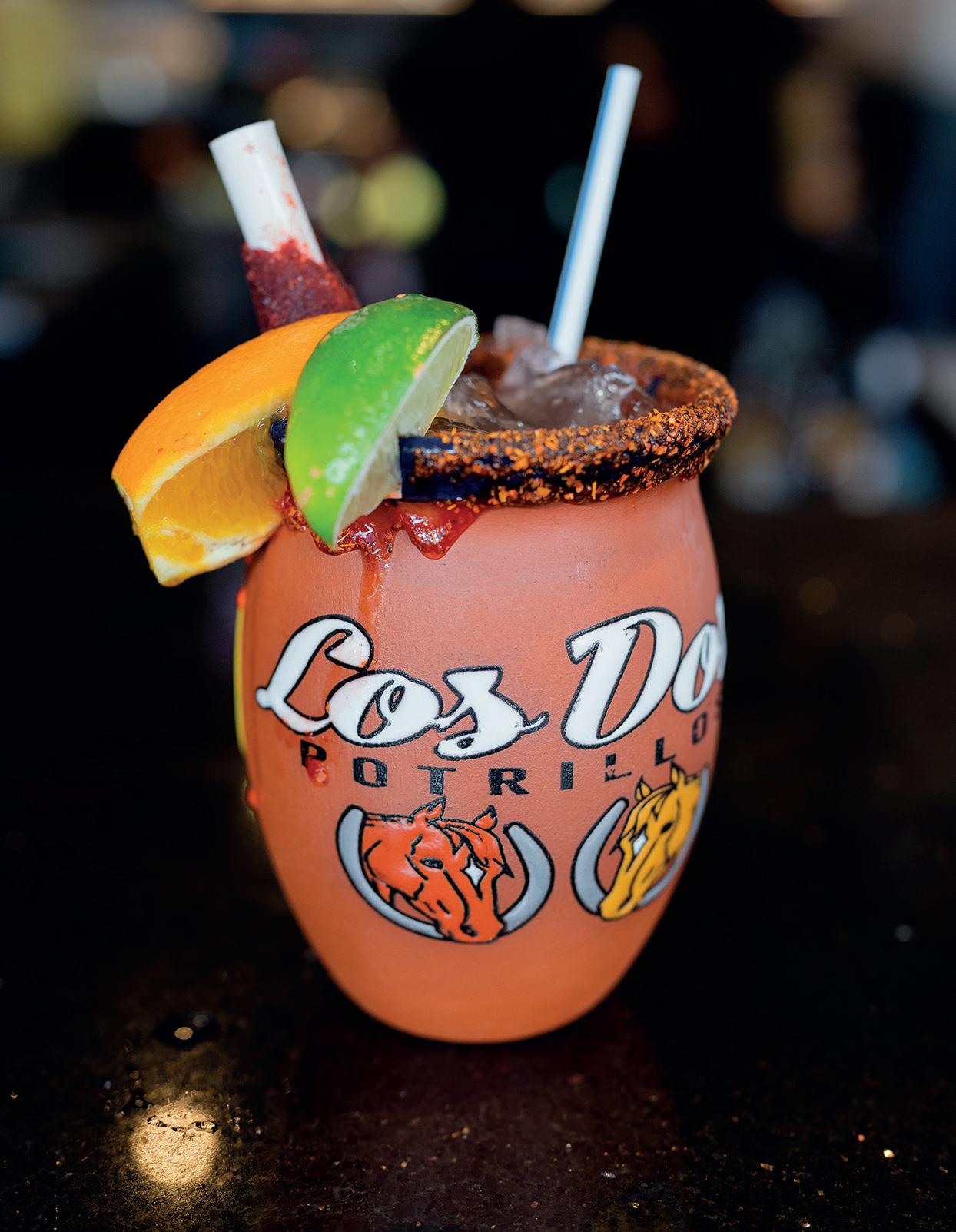
“One night in Mexico, that is what customers can expect from a visit to one of the Ramirez Hospitality Group’s locations. Each one is built on the vision of letting our customers visit Mexico, and offering them the same food we knew as kids. We have a little bit of everything. When you come in, you are going to hear some of the most famous singers from Mexico; the margaritas, the atmosphere, the energy is fun and electric,” expresses Luis.
Daniel takes Luis’ thoughts one step further, saying: “Walking into any one of our concepts is magical. The moment you walk through those doors, you are welcomed home, because we have created a space of community and family, just like the one that we grew up with.”

We then ask the brothers to share more about the specialty dishes that the business is known for, and the options are endless. “Our number one seller right now is our Carnitas. We make these in a big traditional copper Mexican pot. The chef starts at five in the morning, and it takes about seven hours to make. We also have approximately 13 homemade salsas, and once all those flavors are combined, it is truly something special. Our food is uniquely tasty, and that’s what keeps customers coming back.”
Then, as we hear from Daniel, there is also the company’s renowned green chili. “This is where the Colorado taste comes

in. Instead of a flour base, we use a corn starch base, and some other spices I cannot say but you can put that on anything. We put it in burritos, we eat it with a spoon or, in a bowl with a tortilla, and it is home made every single day. We have tortilla makers who produce the best tortillas from scratch every day,” he says.

With a fantastic concept ready to grow, Daniel and Luis are excited about the opportunities that lie ahead, especially the new concept that is set to take off in November
2022. “We have the opportunity to purchase our buildings now, which will give us a little leeway, and serve as an excellent asset when it comes time to opening new locations, like the one in November. We are excited about this concept, Los Dos Potrillos Cocina y Cantina. We have taken the best 50 items from all our restaurants, and those are the items that are going to be on the menu.


“In addition to that, we are going to introduce a pickup window, which has come as a result of the pandemic. People don’t like going into the restaurant so they would rather collect their order. We really want to expand this operation across the business, then move it into more locations across the US, and eventually maybe one day head over to the UK,” shares Daniel.
The brothers are excited about where the business is heading, and with goals to have over 200 locations of their new fast casual concept, they want to continue instilling the same values their father raised them on. “Our employees continue to be the best versions of themselves, and because of that, we love what we do and from my perspective, there is no other job I would like to do. I have the best partner in the world with my brother and despite the obstacles that we’ve faced, we always come back stronger and better than ever and we keep that relationship well.”
As young, Hispanic entrepreneurs, the Ramirez brothers are proud to represent their family as first-generation Americans. Therefore, both of them are determined to fulfil their father’s vision of becoming a restaurateur. “Our dad wanted to open one restaurant, and we got to open two, and now we are about to have more than six and it is truly something special we have been able to do,” Daniel concludes. ■




Los Dos Potrillos has been providing Denver with exceptional food & service for 20 years!




We at Sysco greatly appreciate our partnership and look forward to many years of continued success.
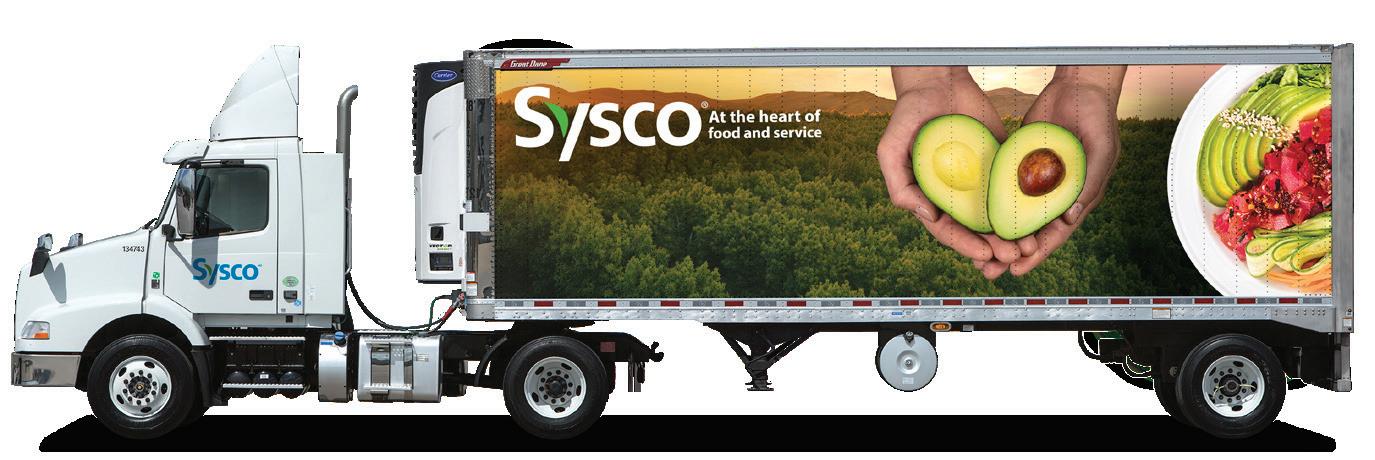

The unique, game-changing approach to the moviegoing business that is setting Santikos Entertainment apart
One thing we have learned over the years is that the movies are not dead,” contends Rob Lehman, COO at Santikos Entertainment. “I have been in this industry for more than 30 years, and fear surrounding streaming and how it might impact the theater business is not new. First, there was VHS, and then Blockbuster; next came home theaters, then Covid-19 and Netflix. There has always been some threat. Soon there will be another.
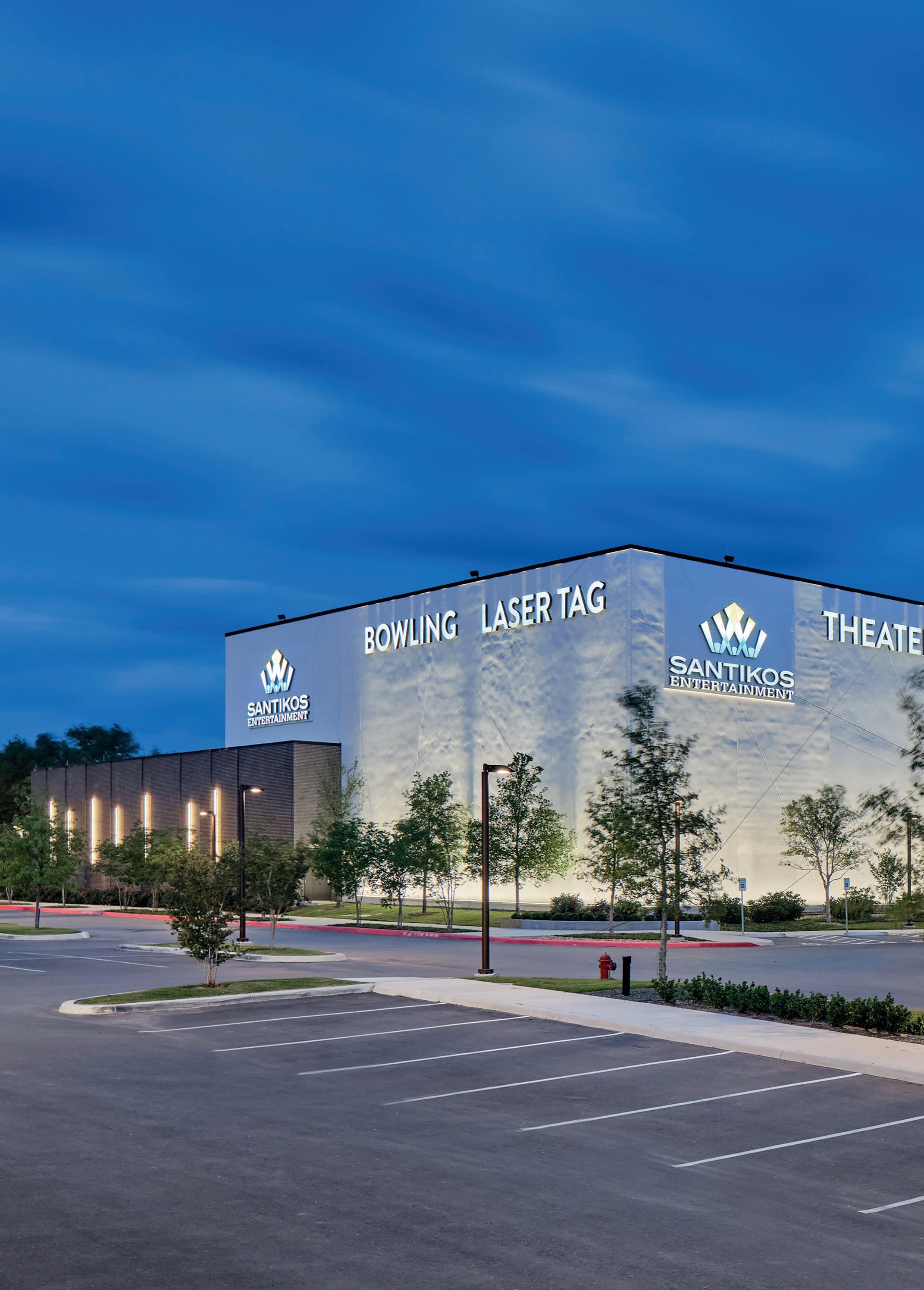

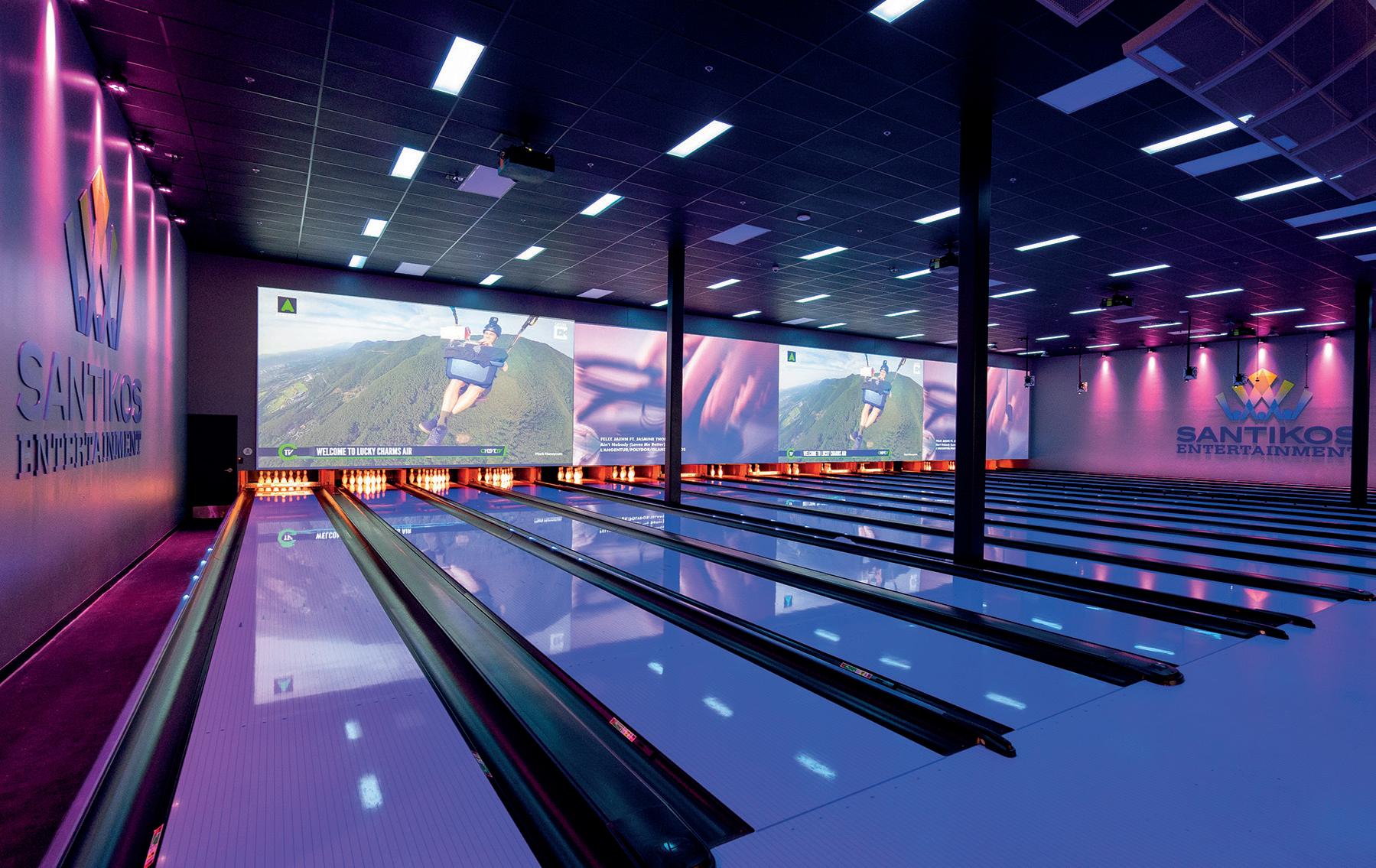
“However, what we have learned, especially over this past summer with Top Gun: Maverick, is that if Hollywood continues making great movies, then people will keep coming,” he goes on. “People want to enter a dark auditorium and get lost in the magic. You do not get that experience with streaming.”
Since 1911, Santikos Entertainment (Santikos) has been helping people get lost in the magical stories of the big screen across the state of Texas. Just as beguiling, though, is the Santikos story itself. So let us tell it.
Louis Santikos, who would later give the company his name, left his home in Athens, Greece, for central Texas at the young age of 19. He picked up some work in a local grocery store, and while he was stocking the shelves, he noticed a long line of people waiting outside the Rex Theatre across the street; smiles adorned faces and lips let out hushed whispers of anticipation. In 1911, after saving whatever he could, Louis was able to buy that very theater and thus began a legacy.
Louis’ son, John L. Santikos, would take that seed and nurture it over the coming decades. One theater quickly became two, then three, and the Santikos name was soon written in bright lights across more than a dozen locations.
By merging cutting-edge technology with a comfortable and welcoming atmosphere, conjured by pre- and post-movie chatter over a drink at one of the


“ “
There are community parks, basketball courts, food banks, and hospital rooms all across the region with John’s name on them. We are the community movie theater chain here in San Antonio
“




many bars featured at Santikos venues, John established the brand as the leading theatrical experience in the Texas area.
Though John passed away in 2014, the legacy that his father started and that he helped blossom is still alive, and, more importantly, it continues to help others. On his passing, John gifted the bulk of his estate to the San Antonio Area Foundation. Beginning in 2015, the John L. Santikos Charitable Foundation has distributed millions in grants and scholarships to support specific areas of interest John had. These include people in need, enhancing health and wellness services, providing youth with education opportunities, creating vibrant arts and culture programs, and offering services that have helped improve the quality of life for people living in the region since 1964.
At Ben E. Keith, we believe in the value of consultation on a personal level. It is difficult to add true value for operators as a foodservice distributor, if we are not on location to help diagnose the underlying causes of the issues that we are working to help create solutions for. Our 116-year history has been built on forming meaningful relationships that foster genuine business partnerships. The result of those partnerships is to properly supply our customers with both product, and valuable tools and information that help them realize their ultimate goals.

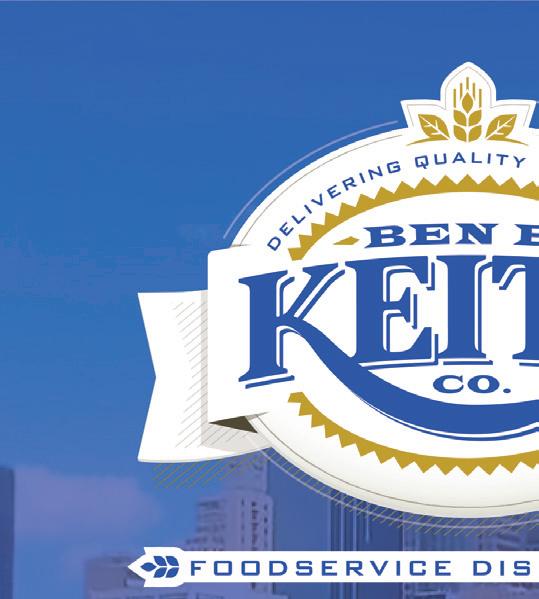



As Rob points out, that means profits from every purchase made at a Santikos location goes directly to fund charities that benefit local people in need. “Since John passed away, we have given over $70 million back to the San Antonio area, and if it were not for Covid-19, that number would be higher,” he reveals. “There are community parks, basketball courts, food banks, and
hospital rooms all across the region with John’s name on them. We are the community movie theater chain here in San Antonio.
“John left a truly staggering legacy,” Rob continues. “Currently, we have ten theaters here in San Antonio. We have carved out a 55 percent share of the box office market in the region. Indeed, we operate the number one and number

two theaters in Texas in terms of box office gross. If you look at the US as a whole, these locations represent the country’s tenth and fourteenth biggest theaters. Fortunately, all that success means we can continue doing even more for our communities.”
Rob joined Santikos in 2017 after running successful food and beverage departments at two different theater chains, bringing with him a wealth of experience and fresh ideas. As he notes, food and beverage sales play an

integral role in the success of movie theaters. When Top Gun: Maverick was making waves and breaking box office records, Rob explains, the studio behind the picture was taking 65 cents off every dollar Santikos made. However, food and beverage sales buoyed by the film meant the theater chain could also partake in its success.
With that established, it is not surprising then that when Rob joined Santikos, first as Senior VP and in his current role as COO, he wanted to take the company’s food and beverage department further. He has done that by implementing a more streamlined approach to food service and delivery.
Cheeseburgers, mozzarella sticks, fries, and nachos are all in the hands of a young theater clerk calling out an order number without much clue about what is happening. It all sounds too familiar to those in the theater game. Enter the APEX system.
“To give you an idea what APEX is, let us run through a typical order at one of our theaters,” details Rob. “You walk up to the concession stand and you order popcorn, soda, and a cheeseburger. First, we will give you your popcorn and soda and then take your phone number. The remainder of the order goes back to the kitchen, where it is prepared with care. Then, when it is ready, we will walk your food to a locker, put in the order number, and then send you an automatic text message with a barcode. You can scan the unique barcode at the locker, and the door holding your food will open.”
“Working with Apex has been a long process,” he adds. “We had to integrate it with our Vista software program, but it has since worked really well. Another thing that might not be apparent initially is the labor savings it offers. With less time serving customers, our employees can spend an increased period of time making the food even better in the kitchen before simply walking over to the



lockers and then moving on to the next order. APEX has definitely been the biggest thing we have done in the last five years.”
Alongside self-serving popcorn warmers with a built-in buttery topping dispenser, Santikos has also ventured into high-end cinema experiences by investigating the viability of dine-in settings. To give some context, it is worth having a taste of the kind of foods on offer: traditional and boneless wings served with BBQ, buffalo, lemon pepper, or sweet and spicy sauce, epic nachos topped with either spicy beef or chicken, as well as melted cheese, pico de gallo, sour cream, and jalapeños.
Then there is the California burger and its vegetarian equivalent, which tops a patty with fresh guacamole, pepper jack cheese, lettuce, tomatoes, and pickles. Harking back to the Santikos name are Greek gyros, a mix of lean beef and thinly sliced lamb, red onions, and fresh tomatoes served with warm tzatziki-coated pita bread.
“In terms of dine-in theaters, we have The Mezz Experience at the Palladium, which is our number one location,” says Rob. “Upstairs, our four big auditoriums were remodeled in 2017 to see how a dine-in experience would play out in the final two rows of the screen. Though that is the only example we have continued of its kind, it is truly a sight to behold. At The Mezz, you will find a well-stocked craft bar and a beautiful entranceway, and then once you enter the screen, a pod seat awaits, offering privacy and comfort all at once. It offers an incredible way to watch a movie.”

That is the business Santikos is in: finding new and innovative ways to tell stories on the big screen. As our conversation draws to a close, Rob is keen to echo this point, highlighting that the company is determined to change how future theaters will be built.


“It is no secret that we have a lot of screens on this side of town,” he says. “So, we wanted to do something different for our next venture. We started hammering out ideas, probably over several pints of Legacy Lager (our own Santikos house beer, which was created in collaboration with Freetail Brewing), and what we came up with is truly exciting, and it is starting this month. We will create a whole new destination that people will want to spend time in across nine auditoriums, 14 lanes for bowling, over 50 arcade games, party rooms, two VIP theaters, and a bar.
“With these high-end theaters, we are changing the whole model,” Rob concludes. “Santikos is now an entertainment business, which does not just mean movies anymore. Come to some of these theaters and go bowling, play arcade games, or just sit at the bar with a cold beer and watch some sports on our TVs. Times are changing. I am excited about where we are headed over the next five years and how John’s legacy will grow.” ■

Superior Grocers (Superior) opened its first store in Covina, California in 1981. Since then, it has grown to encompass 70 stores throughout Los Angeles, San Bernardino, Riverside, Orange County, Ventura County and the outskirts of southern California. One of the largest independently-owned chains of grocery stores in southern California, Superior’s philosophy is to offer the highest quality products at a value with exceptional customer service. Shoppers can always count on excellent quality, variety and value when shopping at Superior.
In addition to celebrating its 40th anniversary last year, in 2021, Superior’s charismatic CEO and Founder, Mimi Song, was inducted into the Food Industry Hall of Fame. Executives and industry insiders said it is a well-deserved honor for Mimi, who as a young woman, in 1977, immigrated to Los Angeles from South Korea. From her first job as a cashier at a Korean grocery store in Los Angeles, Mimi founded Superior with a single former Smith’s Food King store in a less than

From humble beginnings to a California community - how Superior Grocers has become a cut above
prime location. She came to the US with no experience of the industry but through hard work, dedication and determination, she and her team have grown the business to where it is today. Universally admired for her attitude, energy, work ethic and emphasis on teamwork, Mimi’s attributes are reflected in the company’s core values of integrity, service, passion and excellence, which have undoubtedly, helped to secure Superior’s success.
Today’s Superior team, headed by President, Rich Wardwell, alongside CFO, Blake Larson, VP of Marketing, Dale Nakata, VP of Grocery, Sally Hernandez, VP of Produce, Jon Holder, VP of Meat, Mari Mani, VP of Bakery & Hot Foods, Agustin Cabrera, VPs of Operations, Miguel Alarcon and Micheal Hilton, VP of

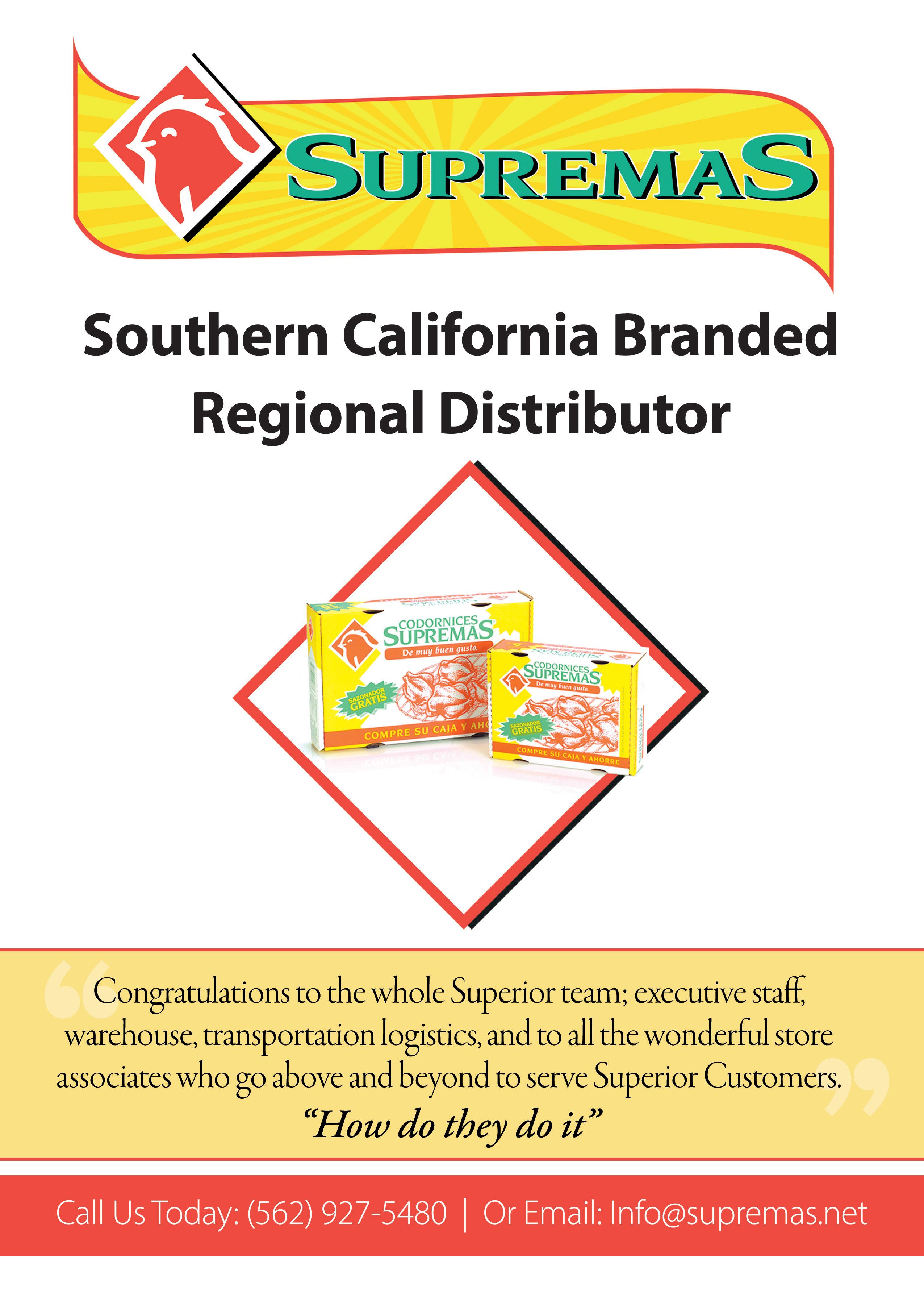
VP of Distribution, Mark Harding, VP of Facilities & Construction, Leon Lopez, VP of Asset Protection, Darian Griffin and VP of IT, Bob Ing, continue to champion those values. As Rich says: “We are dedicated to building a community of loyal customers, vendors and staff where food shopping is fun and the spirit and love of family guide our actions.”
Superior is proud to have prospered in neighborhoods where others have tried and failed, and this success seems due to an inherent commitment to, and investment in, the communities it serves. Almost all of Superior’s stores are in markets that serve the Hispanic community. As an immigrant, Mimi’s special allegiance and responsibility to other




“ “
Superior is proud to have prospered in neighborhoods where others have tried and failed
“ “
With five new location sites currently under construction, Superior opened a new store in September and will open another one in November.
As Rich expounds: “We will also be looking to advance our brand offering into neighboring states.
Our goal is to be at 100 or more stores by 2025 and with the recent acquisition of Numero Uno, we are well on our way.”

To meet the needs of health-conscious consumers, tortilla and wrap brand Mission Foods has introduced Zero Net Carbs Tortillas that also contain zero sugar, as well as being keto-certified, high in fiber and low in calories. Made with high-quality ingredients, the product line comes in two varieties: original and sundried tomato basil, the latter featuring zesty sundried tomatoes and fresh basil flavors. The launch is particularly timely, as consumer research reveals that more than half of shoppers are seeking foods with less
Superior takes great pride in the abundant variety of freshly prepared products found in its bakery, meat and seafood concessions. “We sell a wide assortment of products but mostly cater to the Hispanic communities in which we operate,” explains Rich. “While we offer select products, such as grass-fed, choice beef and a variety of over 40 organic
sugar, and more than a third are looking for fewer carbohydrates on nutrition labels.
Guerrero Tortillas, the brand known for inspiring traditional Mexican home cooking with its tasty tortillas, tostadas and snacks, is bringing you a new line of better-for-you products that don’t sacrifice the authentic flavors you love and enjoy: new Zero Net Carbs Tortillas. Keto-certified, zero sugar and high in fiber, the Zero Net Carbs Tortillas are currently rolling out nationwide. These tortillas are available in two, mouthwatering flavors: the original customers know and love, and tangy, smoky chipotle.
produce items, our power actually lies in our basics. With over 400 produce offerings, including a wide variety of service meat, seafood products and our popular in-house tortillas and chips along with a full-scratch bakery producing fresh pan dulce and cakes, our emphasis is always on delivering quality, variety and value.
“We are also continuing to add ‘better for you’ products to our offering as part of our commitment to improving the health of our communities.” Indeed, Superior makes
it easy to eat healthily by offering fresh produce, lean proteins and wholesome grains; all at affordable prices. A broad range of healthy food choices and education surrounding how to create and maintain a tasty, healthy diet are all part of how Superior contributes to the health and wellness of its customers. Community health fairs take place at all stores throughout the year. These events provide free health screenings and offer awareness and disease prevention education to empower customers to make the best nutritional choices and to keep communities thriving.
In addition to beautiful, spacious stores, filled with fresh foods, Superior also offers services to support the local community. One of Superior’s core values is placing a high priority on exceptional customer service. That is why the business offers a range of
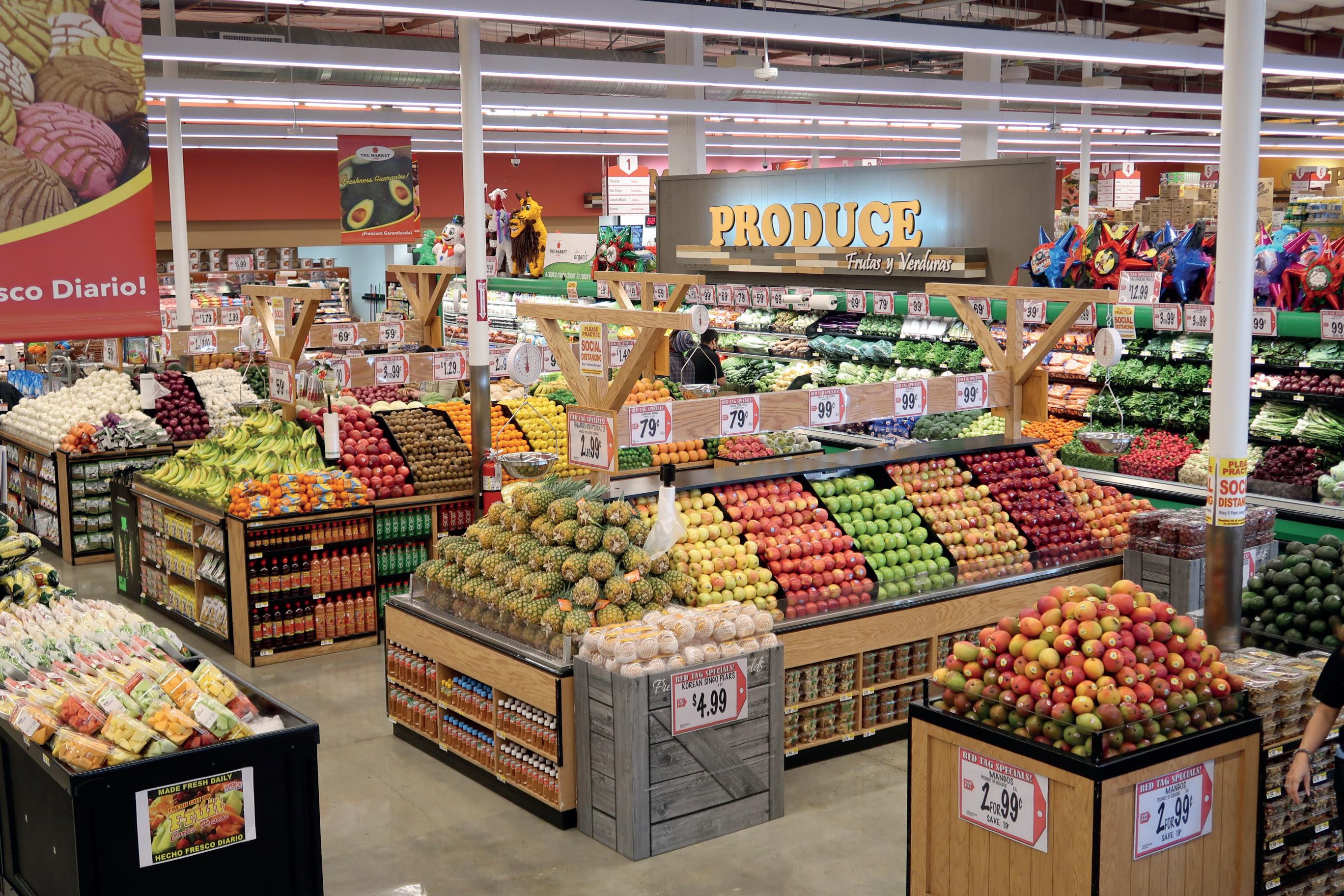
We have always been focused on service and the delivery of a frictionless shopping experience
“ “
services to satisfy its customers’ additional needs. From utility bill payment processing and money transfer services to check cashing and ATMs, Superior takes the time to invest in its community and ensures that all people are served equally with care and respect.
Like many other businesses, Superior was heavily impacted by the Covid-19 pandemic. “We had to change the way we did business overnight,” says Rich. “We had to meter people at the door, operate every other check stand, deploy six-feet social distancing at all service counters and we had to stop and sanitize surfaces every half an hour. In order to make sure our employees were safe, we put

up barriers at service counters, rearranged break rooms, set up outside areas and hired companies to come in and regularly sanitize the stores. All self-service areas had to be manned in order to meet the customers’ needs and we changed operating hours to service the elderly in our communities.”

As Rich goes on to discuss: “We have always been focused on service and the delivery of a frictionless shopping experience. While our stores boast self-checkouts, in-stock conditions and full-service specialty departments, we obviously had to pivot drastically to be able to meet the needs of our communities during that incredibly difficult time.”

Furthermore, as Rich continues: “We feel we will continue to grow as the go to place in the communities we serve. There is nothing more important to us than the people that serve at our stores and the customers that allow us and trust us to serve them. We treat each other as we would like to be treated ourselves.”
Superior knows that a community is strongest when it builds from within and the organization wholeheartedly believes that children are the future. That is why Superior’s non-profit organization, Community Re-Engineering Inc. was established in 1995. The Superior foundation helps fund local youth programs that make communities thrive. Proceeds totalling over $3.5 million dollars from the annual golf tournament under the non-profit organization have been distributed to local youth programs and schools. The organization’s vendor partners have been instrumental in helping Superior to achieve this goal through their generous support and participation. From the California Grocers Association Educational

Foundation to City of Hope, numerous partner organizations have received Superior’s support and share in its values of providing exceptional education and health programs.
Rich goes on to explain that Superior gives back to the local community through its education and arts foundation. “Most recently, we provided a local school with backpacks for all the children. We also offer scholarships through the Western Association of Food Chains and the California Grocers Association.
“Additionally, we are proud to support our employees by providing educational support; an example being the opportunity to earn a retail management certificate from Cerritos College. We also just completed our Inaugural English at Work program. This program aims to help our employees in their everyday lives by providing them
with a laptop and the educational provision of English classes. We understand that a job is about more than just a pay check; it’s about respect, recognition, professional growth, and the ability to provide for loved ones. We’re committed to providing career development opportunities in addition to competitive wages and a comprehensive benefits package.”
At Retail Merchandiser, we get the sense that working at Superior is about joining a family of people, committed to excellence. We begin to understand that people are Superior’s foundation. Mimi’s visionary leadership enables Superior’s management, employees, customers and vendor partners to work together and create true partnerships in their southern California communities. ■
www.superiorgrocers.com



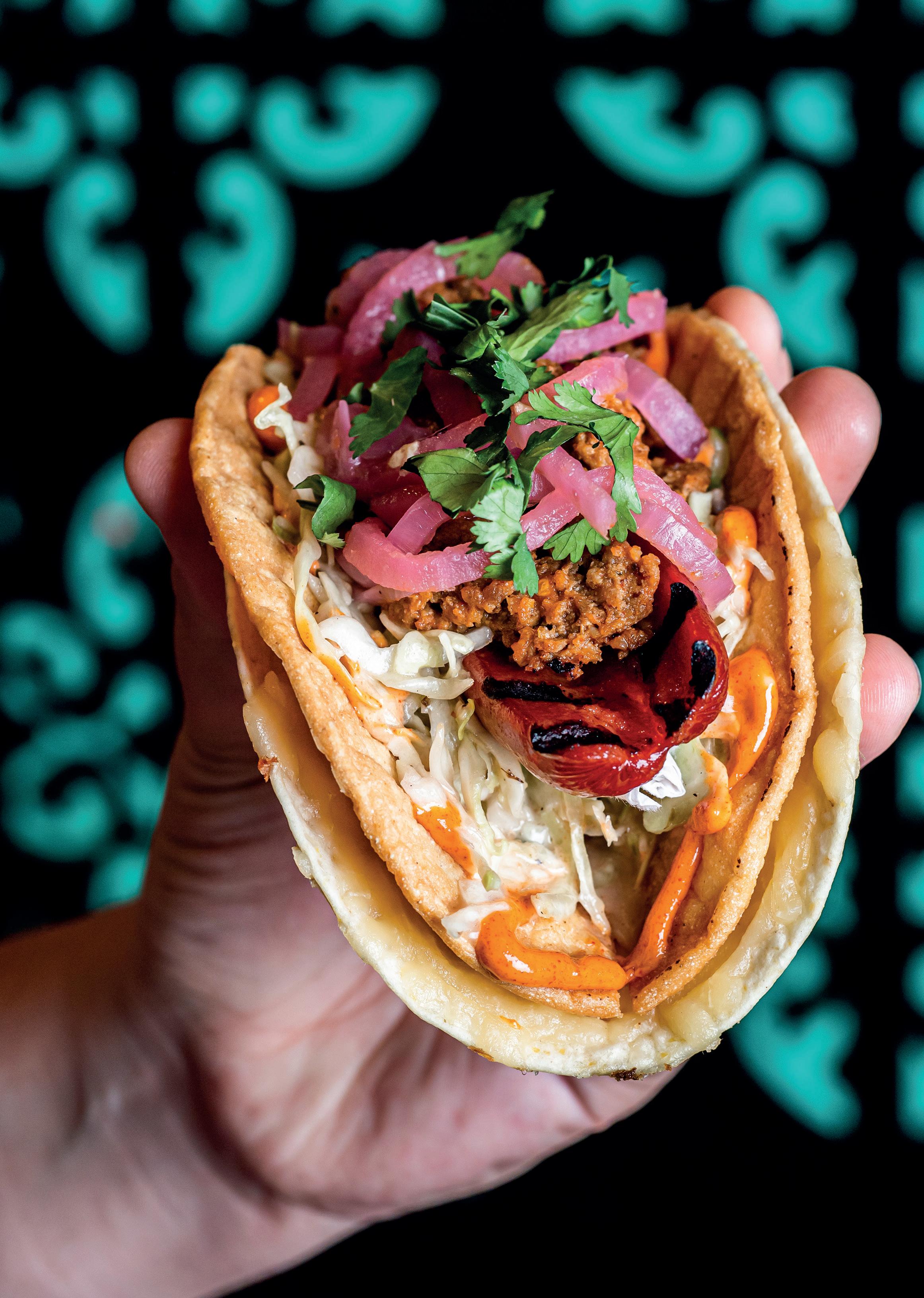 ▲ Tijuana Tommy Taco
▲ Tijuana Tommy Taco
Have a taste of Paladar Restaurant Group’s delectable international tour de force of South American and Caribbean cuisine

The origin of the name Paladar is important to us,” begins Andy Himmel, Founder and CEO at Paladar Restaurant Group. “It comes from the Spanish word for palate or taste; however, we chose the name because, in Cuba, a paladar is a home eatery or small restaurant based out of someone’s house or apartment. Therefore, when we wanted to open a restaurant, we knew it was the name for us. Our customers come home to eat.”
Thus began the Paladar Restaurant Group. The company was established in 2007 with Paladar Latin Kitchen and Rum Bar (Paladar) in northeast Ohio and suburban Cleveland. Since then, new restaurants have cropped up near Washington, D.C. and in the metropolitan Philadelphia market. However, before all that, the group wanted to create an experience that the average suburban diner would not usually have access to (unless they travelled to a nearby city, for instance).
As Andy goes on to explain, most restaurants dotted around the area at the time were American, Italian, or Chinese –and, therefore, much more accessible and straightforward to the average consumer. One knows the difference between carbonara and chop suey. But what about feijoada stew and queso fundido? Not so easy.
“There was nothing around that seemed to take advantage of the great flavors and profiles that are found in Central and South America, Cuba, and the Caribbean,” says Andy. “So, in that sense, we were looking to create a new night out for suburban diners. We opened up Paladar, working extremely hard on the brand, the positioning of the menu, the marketing, and the terminology used since, in many cases, these words on the menu would be totally new to customers. Part of that process was therefore educational, and our goal was to showcase the hearty, soulful, and craveworthy food from that area of the world in an accessible way.”
Therefore, instead of listing a guajillo pepper sauce on the menu, Andy says it will
read spicy pepper sauce instead. “When we began, we were much more direct with the types of ingredients that we were using in our restaurants, using Spanish headers and such,” he reveals. “However, we found that this created a kind of barrier. That is not to say we are dumbing down; rather, we are simply making the menu approachable. We had to make our menu function in a way that did not make people turn away and order a steak elsewhere, but also read in a way that was still exciting for more adventurous eaters.”
Indeed, eight years after the first Paladar, a sister brand, Bomba Taco + Bar (Bomba), was launched. More casual in its approach, three more locations have opened in the suburban Cleveland market and two in the metropolitan Philadelphia region.

Andy is keen to talk us through Bomba’s cuisine. “We are a taco-based menu,” he notes. “That being said, we do not hold ourselves back with any type of international borders: some of
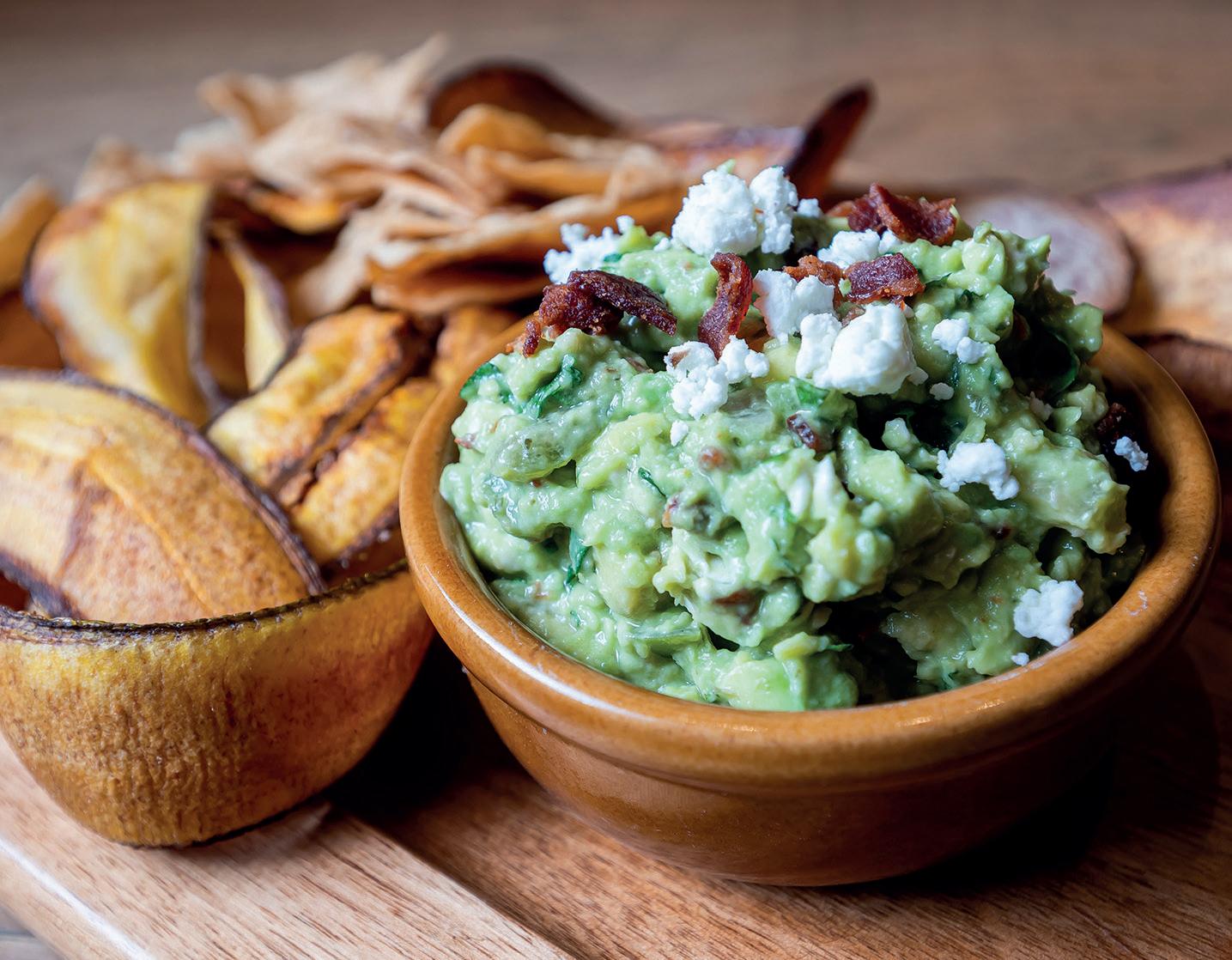 ▼
Craft-your-own Guacamole
▼ Pomegranate Ginger Margarita
▼
Craft-your-own Guacamole
▼ Pomegranate Ginger Margarita
“ “
. . . we recently won the award for Best Guacamole in Philadelphia
“ “
our best-sellers are the Nashville Hot Chicken Taco and our Vietnamese Meatball Taco! We also proudly cater to the vegetarian and vegan communities, serving delicious, plant-based chorizo tacos with pickled onions, mushrooms, pickled shishito peppers, and cilantro pesto.”

Other highlights include the curious Smoked Brussels Sprouts Taco, served with pickled red onions, umami sauce, red Fresno peppers, chili aioli, and plantain peanut crumbs, as well as Bomba Bowls, which include a choice of protein, a selection of toppings, and either white or cauliflower rice.
But, for Andy, a special focus should be placed on the brand’s famous guacamole. “It is house-made and fresh to order; you can also add other ingredients, which is a concept borrowed from our Paladar side of the business,” he reveals. “In fact, we recently won the award for Best Guacamole in Philadelphia at a big annual event hosted there for the fourth year in a row! We serve it with a mix of house-made malanga, plantain and tortilla chips. Delicious!”
As well as snacks like bacon-wrapped jalapeños and harissa cauliflower wings, Bomba also serves incredible desserts.
One is the new churro waffle, made from scratch with house batter and served with unique toppings such as burnt marshmallows, bacon, and ice cream. While the conversation then drifts to food under the Paladar brand – including chicken empanadas, adobo steak and blue cheese, and shrimp elote salad – Andy highlights what he considers to be the truly fun part of the brand: the rum bar.
“Each Paladar restaurant has 100-to-130 rums on hand, and all of the information you need to make an informed decision is handily kept in our Rum Bible,” he tells us. “We are really proud of it. It walks customers through the process of making rum, the locations behind each brand, and the various histories attached to them – it is educational as well as a guide to a good drink! Whether Spanish-, French-, or English-style rum takes your fancy, the thrill of discovery can be found in every bottle and each glass.”
Some favorite cocktails include the Jungle Bird (Smith & Cross Rum, LoFi Amaro, honey simple, lime, and pineapple juice), Pusser’s Painkiller (Pusser’s Navy Rum, Bacardi
 ▼ Smokin’ Brussels Taco
▼ Smokin’ Brussels Taco

“ “
Each Paladar restaurant has 100-to130 rums on hand
“ “
Mango Rum, Smith & Cross Rum, fruit juices, coconut milk, and nutmeg), and the tequila-based Jalapeño Paloma (El Jimador Silver Tequila, jalapeños, grapefruit juice, simple syrup, soda, and salted rim to serve).
Going forward, Andy admits that, though he expects to open a new Paladar every two years, the real driving force behind the growth of the group will be its Bomba offering. “The more casual approach is aligned with the market, which
BOUNTY rum is produced by St Lucia Distillers, which is located in the scenic and agriculturally rich valley of Roseau, on the Caribbean island of St Lucia. BOUNTY, also known as ‘the spirit of St Lucia’, was established in 1972 as the principle rum brand of St Lucia Distillers. The business began as a united venture, created when the last two distilleries on the island, the Dennery

has changed since the pandemic, and you can expect to see one-to-two open each year going forward,” he concludes. “Over the next five years, decisions related to internal and external growth will be made with the objective of building value, while developing a brand that offers a welcoming home to all people.” ■
Distillery and Roseau Bay Distillery, merged. BOUNTY rum captures and conveys the island’s most dynamic and festive qualities, which stem from St Lucia’s traditional and cultural roots. The rums are a blend of column still rums from molasses, and known for their clean and soft mouthfeel, and wonderful character, ideal to be enjoyed in your favorite cocktails.
The secret sauce(s) behind Sticky’s not-so-secret chicken shop success


With 14 locations – nine in New York and five in New Jersey – Sticky’s, a contemporary take on the classic American chicken shop, is slowly taking the northeast coast by storm. Created out of a love for all things chicken and a desire to think outside the ordinary, Sticky’s strives to be the best by offering gourmet chicken fingers and homemade sauces that taste clucking good.
“I am a huge fan of sauces and the unique flavors they can add to a dish,” begins Jon Sherman, CEO and Co-Founder at Sticky’s. “The beauty of chicken is its mild flavor; because of this, it works with a vast range of flavor profiles. In fact, I regard chicken as a blank canvas that works with anything – if sauces are good on their own, then you bet they will be good on a chicken finger! You cannot really say that about other kinds of proteins. I love eating beef, pork, and fish; however, only certain types of sauces will work with them.
“We have a handful of sweeter sauces, but also sweet and savory combinations,” he goes on. “With these different mixes, the flavors of the chicken and the sauces come together in a way that makes Sticky’s a truly unique experience. Ultimately, it also means that people will not only crave our food because it is delicious, but because they are able to come back and get a vastly different experience next time by trying a new sauce.”
Chicken can be bought as either crunchy, grilled fingers or as poppers (coming in small, medium, and large sizes), or as tender boneless thighs. For the latter, Sticky’s also offers a popular hot honey version: crunchy dark chicken meat slathered in hot honey sauce and Carolina Reaper flakes.
But truly exciting things start happening with the fast-casual restaurant’s signature creations. Here, Sticky’s and its creative imagination around chicken really comes to life.

There is the Thai Fiesta, for instance, which features mac sauce, Thai sweet chili, taco seasoning, and sesame seeds. Or the Vampire Killer with its vampire aioli (creamy roasted garlic dip), grated parmesan, garlic chips, and dusting of pink peppercorn flakes.
Also available, among many others, is the Buffalo Ranch option, which features buffalo balsamic maple sauce paired with buttermilk baby ranch, all on a bed of shredded carrots. In short, there is truly something for everyone –18 homemade sauces back this up.
These include Caribbean Sweet Heat, a hot pineapple and mango chutney; Nashville Numb, a Southern-andSzechuan-inspired hot sauce; Waffle Sauce, a sweet maple frosting; and General T’Sticky, a Sticky’s take on the traditional American-Chinese classic.
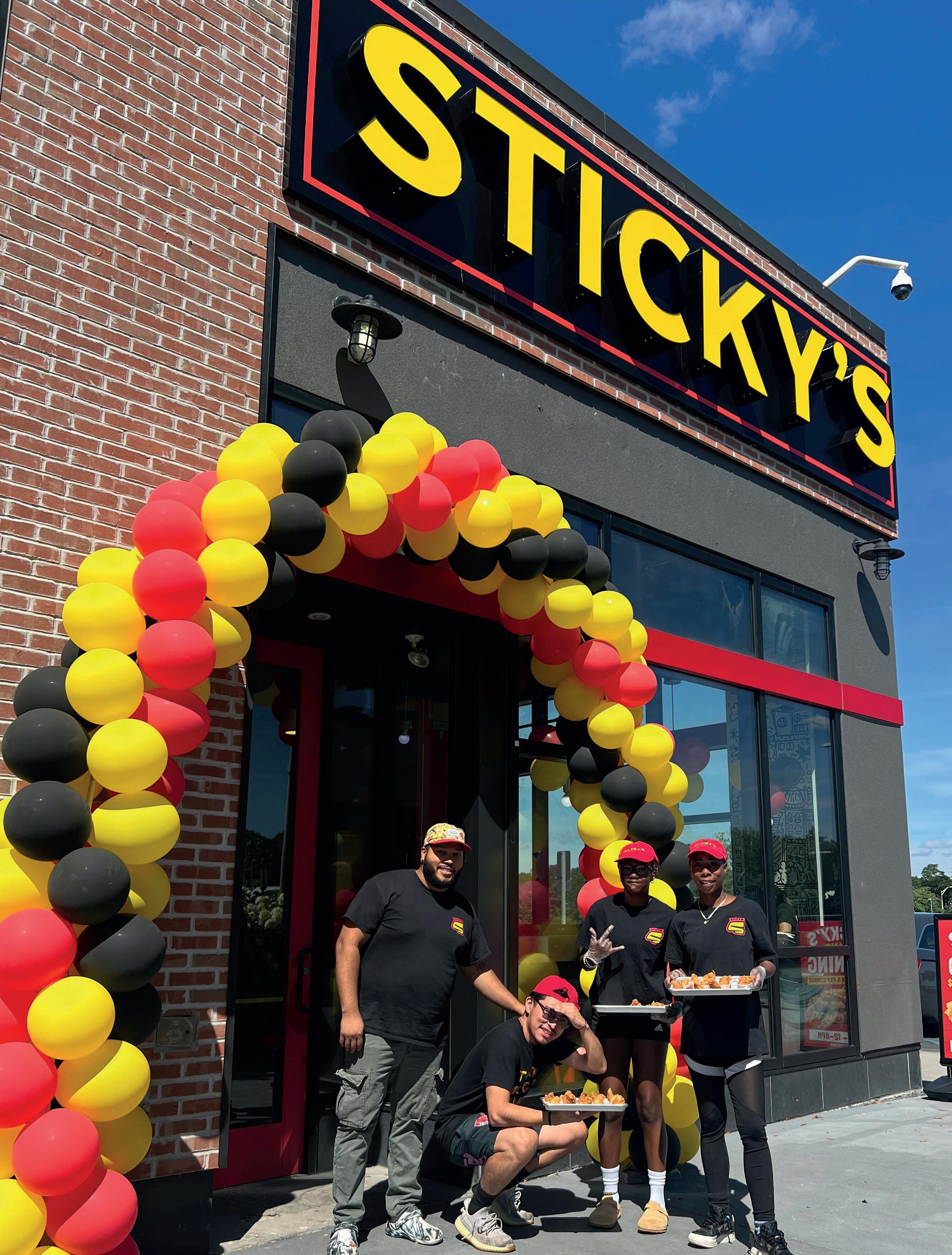




Whatever the palate desires, the palate may have. Sticky’s’ menu also includes sandwiches, specialty items, wraps, salads, and a range of French fries –some of which are more adventurous than others… We are looking at you, S’mores fries (a serving of straight cut fries dressed with marshmallow sauce, chocolate sauce, crushed graham crackers, mini marshmallows, and parsley). More pedestrian options like bacon mac and truffle parmesan fries are also available.
Though Sticky’s is proud to be a New Yorker business, it is now looking further afield. “We began our operations in New York City, and let me tell you, that city is a unique animal – particularly before the pandemic,” explains Jon. “It is the place where I have lived for a large portion of time, and I know it intimately well. So, when launching the business, we really relied on our knowledge of the market. It has certainly been a learning experience moving beyond the city, because nothing is like New York.
“In the city, there is always foot traffic and an immense density of people,” he continues. “There is really nothing quite like it. Therefore, once you leave New York, it is almost like you are starting from scratch, even just from a real estate and site selection standpoint. Nevertheless, we have recently ventured out, opening a restaurant in the Cross County Mall in Yonkers. It has been really exciting.
“We are testing out a lot of new things, including a slightly different menu and

service model,” Jon adds. “It is helping us think about what kind of thing we will be doing going forward. Early performance has been strong, and we are pleased to be in Westchester County, just outside of the city in New York State. Guests are really excited about the new venture, and it has been great to see some of the familiarity they are already showing with the brand, even though it is a new market for us. So, in all, it has been a really promising start and we intend to look at other markets outside of the city.”
Even though Jon admits that the market for gourmet chicken has grown tremendously over the last ten years or so, he firmly believes that the Sticky’s brand and product offering is highly differentiated within that space. Hence, wherever the company sets up shop, he insists that people will still flock to its stores thanks to the brand’s unique style, wide product range, sharp culinary focus, and keen emphasis on flavor.
Another facet of the business that sets Sticky’s apart is its focus on technology. “Since our inception, we have embraced technology to support the restaurants as they have continued to grow,” Jon details. “We rely on technology for our operations execution, restaurant management, and customer experience. In general, there are two types of technology that we employ: customer facing and internal. We have built an environment where a range of different programs talk to each other; data flows on a daily basis between technology systems, enabling us to see the business in real-time. To have that information is incredibly beneficial. It allows our store managers and operators to understand what is happening, and therefore manage their individual establishments accordingly.
“Separately, we are also utilizing an app, an online ordering platform, and a loyalty program for our customers to use,” he adds. “Put together, these technologies have been a key part of our strategy for future growth.
As we operate relatively small restaurants, a lot of our business comes from take-out and delivery. By having our own app and ordering platform, we are giving customers the chance to order directly from us. Not only will this offer them the best experience, but it will also offer the most competitive price since they will not have to pay thirdparty delivery fees.”
Data garnered from direct ordering also means that Sticky’s can amass a wealth of information regarding the ordering habits of its customers. Richer data that details customer behavior is incredibly valuable; it means the brand will now be able to communicate more effectively, zeroing in on what the people really want.
On top of that, a loyalty program model ensures customers keep coming back by incentivizing more frequent visits. “It is always going to be a process of evolution where technology and how it applies to a business are concerned,” explains Jon. “Therefore, as the landscape changes, we will continuously adapt as more robust platforms and digital offerings become available.”
Going forward, Sticky’s is hoping for a return to form and another strong period of growth. “We approached the beginning of the pandemic with exponential growth in 2019,” Jon reflects. “In fact, we doubled our store count and had a few more in the pipeline; however, it is no secret that it has been challenging to operate our business over the last couple of years, particularly with so many stores dotted across New York City.
“As we look beyond the height of the pandemic, we hope that things will normalize once more, especially across the supply chain where we are still seeing enormous price pressure on a lot of the ingredients we purchase, and we can resume our growth trajectory,”

he concludes. “Right now, our primary focus is on everything we can do at an execution level and on a supply chain level. Therefore, when things do pick up and we begin to upscale once more, we will have moving parts under control.” ■
Today’s restaurant brands face more challenges and opportunities than ever before. Whether you’re building next generation digital guest experiences or managing cost pressure, restaurant leaders can’t win tomorrow with yesterday’s tech.

Born in the cloud, Toast’s software platform connects employees, operations, and guests, no matter how many locations you have. Our intuitive Flex POS terminals and Toast Go 2 handhelds power seamless front-of-house guest experiences, while our restaurant-grade Kitchen Display System (KDS) streamlines kitchen ops. Toast’s flexible APIs and integrations with over 170 certified technology partners mean your team and your tech stack can adapt to whatever comes next.
Stickys, Silver Diner Development, The Melting Pot, Jamba, Papa Gino’s and hundreds of other leading enterprise brands trust Toast to power their businesses.
And with one billion dollars in pledged R&D investment, we’re just getting started. Learn more at pos.toasttab.com/enterprisewww.stickys.com



When Shannon and Florian Radke appeared on ABC’s Shark Tank in 2014, people across the US were given the chance to see Cinnaholic’s signature plant-based cinnamon rolls, and the Sharks were able to get a taste. It was a resounding success: the couple accepted a deal from Robert Herjavec, which sought to focus on upscaling and shipping products nationwide. However, after much thought and discussion, Shannon and Florian decided to go in a different direction.
The focus going forward shifted towards storefronts and creating a concrete presence for the brand. So far, the move has worked wonders. In fact, just one year after Cinnaholic appeared on Shark Tank, the company opened its first franchise location.

Fast forward to 2022, Cinnaholic, which first began in 2010, now totals 75 units across the US and Canada. Food Chain recently caught up with LeAnne Cavallaro, VP of Operations, and Heather Stennis, VP of Marketing at Cinnaholic, to talk all things cinnamon and more!
“We are a plant-based gourmet cinnamon roll bakery serving handcrafted and decadent treats,” says LeAnne. “These include cinnamon rolls, brownies, cookies, and homemade cookie dough. The brand has been franchising since 2015; two of our myriad locations are corporately owned and the rest are owned and operated by our franchise partners.
▶ Heather Stennis and LeAnne Cavallaro“All our recipes are made from scratch, so it is a labor of love for sure!” she goes on. “We are known for our cinnamon rolls – and these are not your average rolls! They are freshly baked throughout the day and can be customized to your liking. The possibilities are endless. Each bakery offers a range of different cinnamon
rolls, and each of our franchise partners showcases local flavors plus exciting creations that resonate with their customer base.”
Speaking of local, each of Cinnaholic’s locations is also partnered with a local coffee roaster as hot coffee is a core menu offering. For many, you cannot have a cinnamon roll without it!
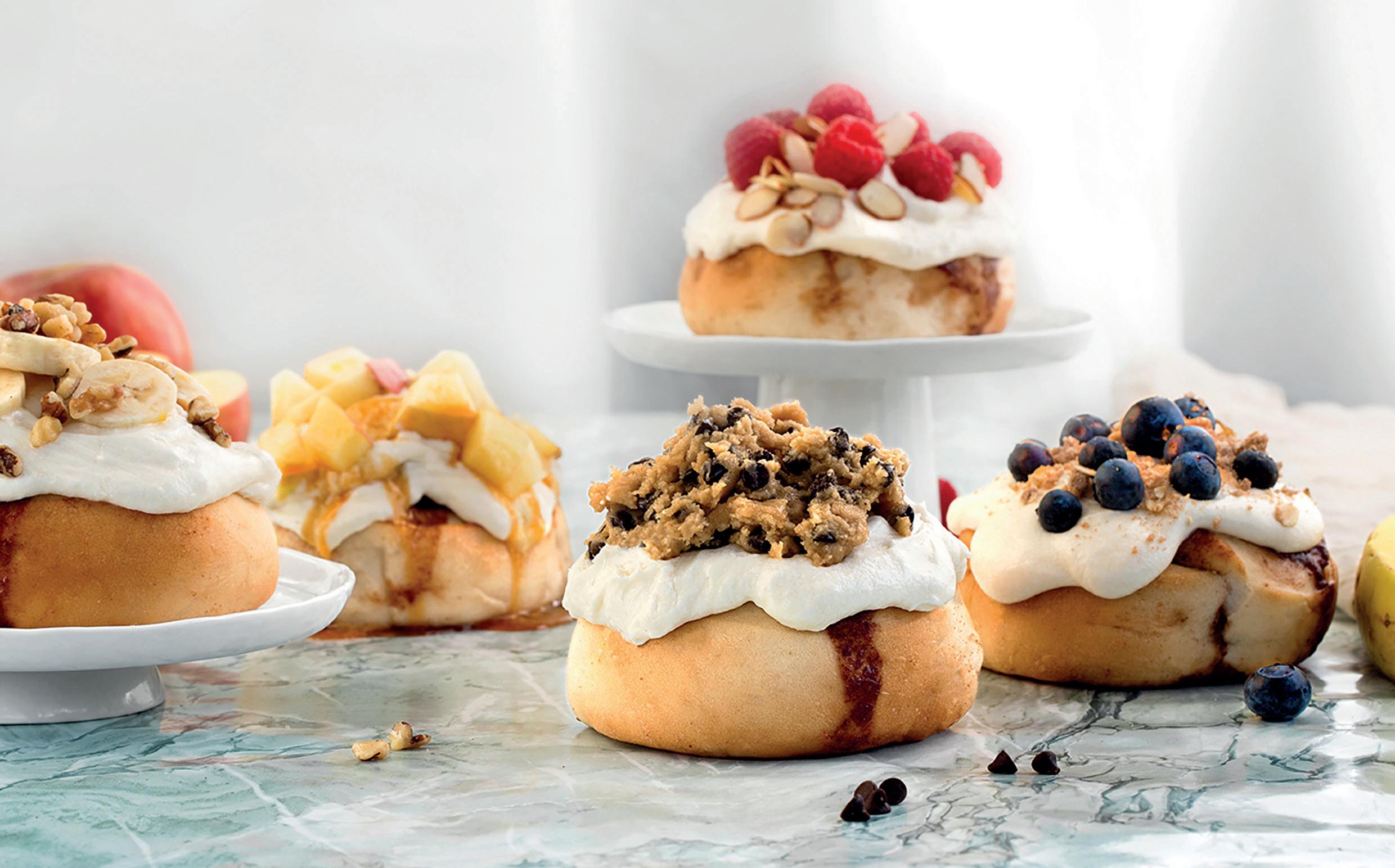
Other location-specific items include blended drinks and vegan Dole Soft Serve; however, a range of core signature rolls can always be found. For example: the Old Skool, which is a classic cinnamon roll with vanilla frosting; the Campfire S’mores, an indulgent treat crafted with a marshmallow frosting, graham cookies,
“ “
We offer over 20 different frosting flavors and toppings, meaning our guests are able to build the perfect flavor profile that they are currently craving
“ “
marshmallows, and chocolate sauce; and Tropical bliss, which features a raspberry frosting, plus blueberries, bananas, and coconut.
“We offer over 20 different frosting flavors and toppings, meaning our guests are able to build the perfect flavor profile that they are currently craving,” explains Heather. “Our menu also offers core signature creations, including our most popular roll, the Cookie Monster, which starts with a cream cheese frosting and is then topped with homemade cookie dough, chocolate chips, and chocolate sauce.”
More recently, Cinnaholic launched its limited fall menu, featuring a new spin on their Pumpkin Spice Roll (pumpkin spice frosting topped with homemade pumpkin bread bites, ‘cinnadoodle’ cookie bites and cinnamon sugar), the Carnival Crunch Roll (caramel frosting topped with popcorn, marshmallows and sprinkles), and homemade Pumpkin Bread (freshly baked pumpkin bread with homemade brown sugar and cinnamon mix baked in). However, while cinnamon rolls undoubtedly make up the heart of Cinnaholic’s bakeries, the brand also offers many other made-from-scratch treats. These include baby buns, or a bite-size version of its signature cinnamon roll, plus brownies, chocolate chip banana bread, cookie dough, and two different kinds of cookies.
If that is not enough to make tastebuds begin to tingle, let LeAnne paint a picture of the Cinnaholic experience: “When you walk through the doors to any of our bakeries you will be greeted by the smell of warm cinnamon,” she details. “We will introduce you to the menu and help you make the perfect selection. Personally, I am a fan of our maple frosting and homemade pie crumble, but another popular selection is classic cream cheese frosting with fresh strawberries.
“You cannot go wrong when it starts with a warm cinnamon roll, so I always say: Just go crazy!” she adds. “But, if it is your first visit, then you have to try a taste of our homemade cookie dough – after a spoonful of that, you will want



to get yourself a tub to take home! Our mission is to solve everyone’s dessert cravings. We aim to create an experience that our guests crave to indulge in time and time again.”












Though Cinnaholic is in the business of sweet treats and tempting people’s tastebuds, that does not mean it has to compromise in terms of its ethics. The brand is vegan – and proud of it. “Maintaining a plant-based menu is at our core, so every recipe is carefully curated,” says LeAnne. “We take pride in crafting madefrom-scratch recipes which we have mastered to taste just as good, but in our opinion, better than traditional versions!
“As mentioned before, our mission is to solve everyone’s dessert cravings while supporting animal welfare and sustainable food practices,” Heather asserts. “The demand for plant-based desserts is very much alive

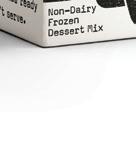















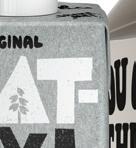
For more info, contact us













and well. Fortunately, we are able to fulfill that demand, both for people who eat a vegan diet but also for people who may have dietary restrictions due to allergies. Over the years, we have seen an increase in uptake of veganism and it is great to see new plant-based options from our suppliers.”
Talking of suppliers, Cinnaholic takes the personal side of the business just as seriously as baking. As Heather goes on to explain: “We’re very team-focused – while each member of the team has their respective deliverables and focuses within the business, we love harboring a collaborative environment. Our corporate team is small but mighty! We work together on everything, whether it be new technology systems or recipes; we value everyone’s opinion and work together as a team to grow the brand.”
When it comes to Cinnaholic’s franchise partners, moreover, the brand offers a few platforms which help to make them feel heard. For instance, it has an internal group on Facebook, where franchisees can network and bounce ideas off the corporate team and each other. It also has a Franchise Advisory Board, which ultimately acts as a sounding board for owners to express themselves directly to the executive team.
Alongside franchising, Cinnaholic has another string to its impressive commercial bow: catering. “We love to cater all types of events and we are grateful our customer base has found just about any reason to order treats from Cinnaholic,” notes Heather. “For our brand, holidays such as Valentine’s Day, Mother’s Day, Thanksgiving, and Christmas are key catering highlights of the year. Catering with Cinnaholic can be as simple as a Bakers Box purchased for a client or family gathering, which includes a half dozen or dozen rolls each adorned with one frosting and one topping selected by the baker!
“Then, of course, we have lots of options that are fully customizable,” she adds. “One of which
is the Cinnacake – a cake made from cinnamon rolls! It is available in three sizes and includes one frosting flavor and up to five toppings. Another is Cookie Cakes, which can be singleor double-stacked, and allow buyers to choose a frosting flavor and up to three toppings. Or planning a wedding? We would love to cater that, too! The most popular catering item for such an occasion is the Do-it-Yourself Toppings Bar: select three frosting flavors and three toppings and whatever sweet treat you want – from cookie dough to cinnamon rolls. Your guests will have fun with this one!”
As it looks towards the future, Cinnaholic can see the wheels firmly in motion. For instance, it has 15 locations actively in construction and over 40 more in various stages of their development process. It is safe to say the US is going mad for cinnamon.
“As we continue in this growth phase we will be focusing on people and processes that will help us support our franchise partners,” LeAnne concludes. “We have expanded our operations and marketing teams and have initiated new partnerships to roll out a POS conversion and loyalty program upgrade. All of this will work towards our greater goal of making Cinnaholic a household name.” ■
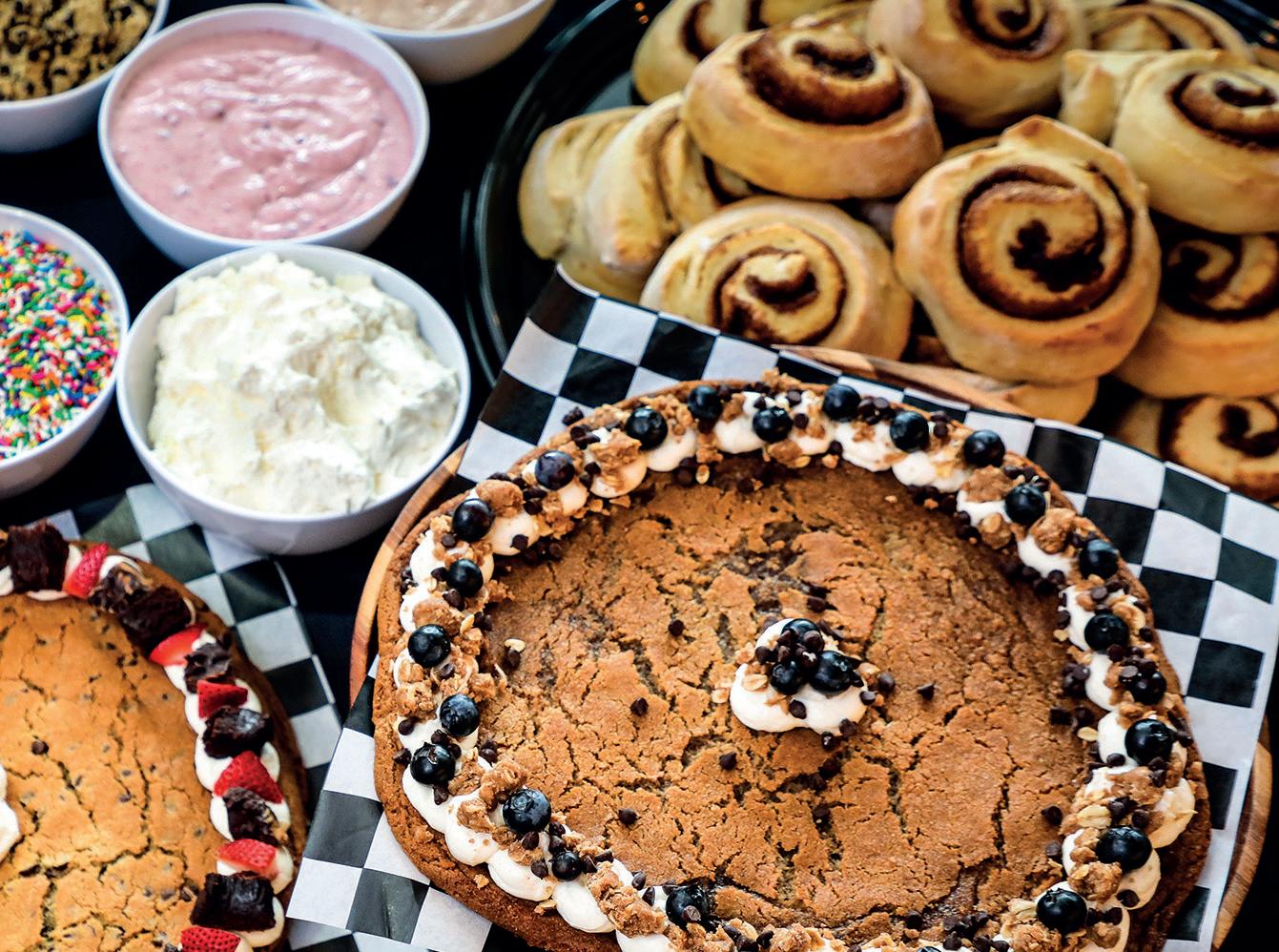
The journey of Patriot Pickle is a coincidental one. Bill McEntee, the company’s President, began his career in the restaurant industry, and saw an opportunity to expand into pickles.
“I should note that we had never made pickles before,” he begins. “We saw a gap in the supply chain for restaurants needing the condiment, so we started to make our own.” This initiative received promising responses from customers and distributors, and continued to evolve with the help
of Bill’s industry intuition. “We then leased a small warehouse building to start making them. Our customer base grew rapidly. We did over a million dollars in sales the first year we were in business. We then bought a 28,000-square-foot building, and our customers have kept coming.”
Patriot Pickle then purchased an additional 54,000-square-foot building next door to keep up with the increase in demand. Today, he is proud to share that Patriot Pickle is the largest producer of refrigerated pickles

How putting people first can lead to success - the story of Patriot Pickle
on the east coast. “Our customer base is a combination of food service distributors and retail. Through the food service channel, our products are then delivered to restaurants and diners. Then, Patriot Pickle provides private label retail products distributed throughout the country,” he explains.
Expanding on the topic of the company’s product range, Bill is happy to announce the launch of two new products, including a tasty and convenient grab-and-go pouch, known as Crisp. “It’s one of the latest that customers
can find at their closest convenience stores. There is no brine solution in it, and it is a healthy snack that you can eat at your leisure,” shares Bill. He goes on to explain that the product comes in four different flavors that range from the more savory, like sweet horse radish, the original dill, and a regular or spicy hot, to the bread and butter, which hosts a sweeter taste.
“The second item is called Pickleade, which is the brine solution that we use to cure pickles. We offer that anywhere from a three-ounce bottle to a 55-gallon-drum. It is a hydration drink for athletes, packed with electrolytes that restore salt balance. On the larger packs, it’s used in some distilleries as a flavoring component for different mixtures that are distilled and cured in alcohol. It can also be used as a marinade for chicken and meat proteins,” shares Bill.
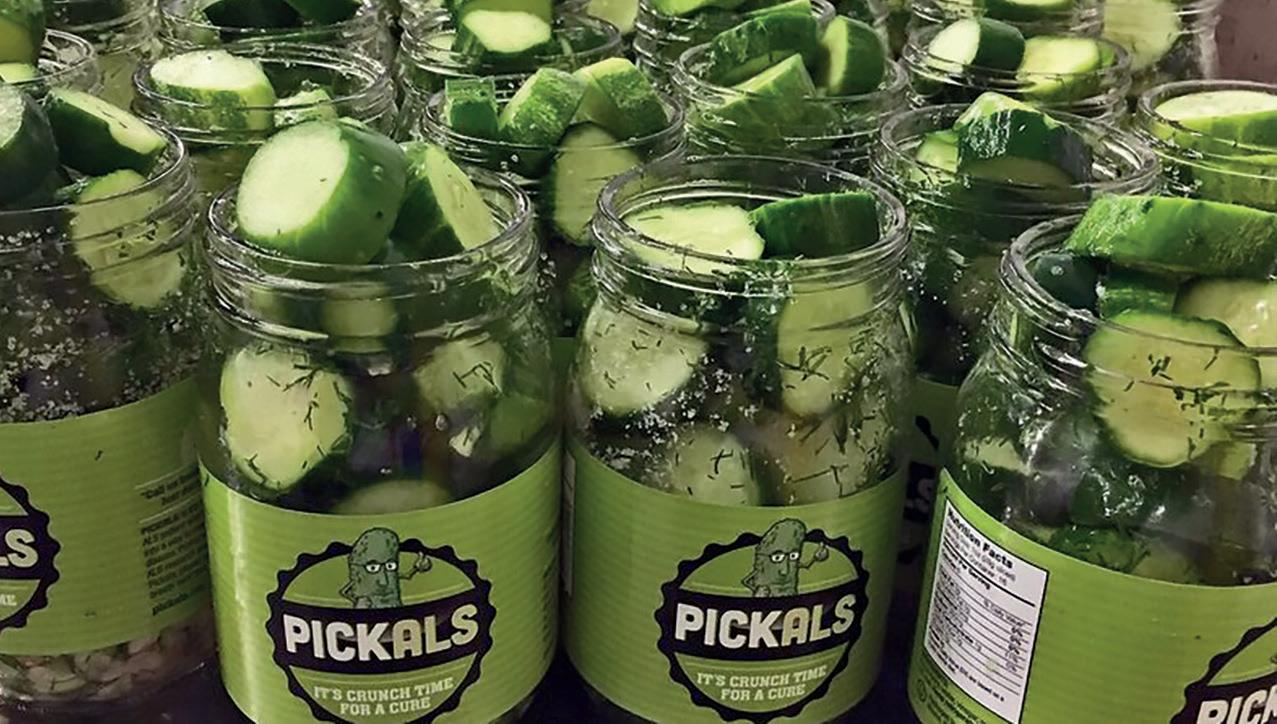
When asked about the company’s secrets to creating a fun and nutritious ingredient, Bill iterates that communication has been the top priority to ensure a smooth operation process. This, combined with his industry know-how, has powered the business forward. “From my experience working in the restaurant industry, we know what restaurant operators are looking for. We looked very closely at ways to solve on-time delivery issues, communication disruptions, and customer needs,” he says.
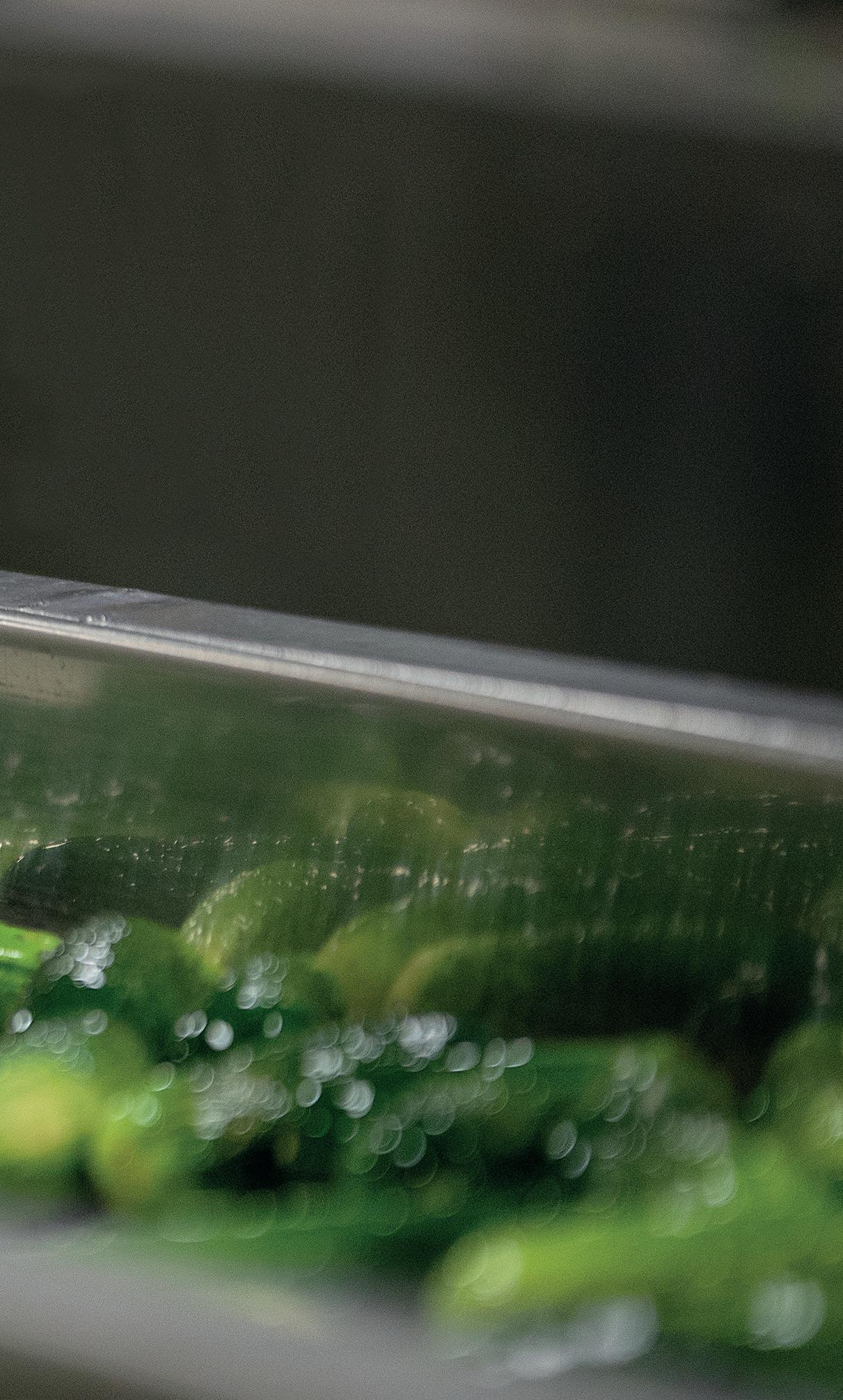
This approach of advocating for communication is then reflected across the company’s supply chain network. “We deal directly with cucumber growers, so we need to keep in touch with that process; that is critical. Then, whether its packaging, costs, vegetables, buckets or our salt and vinegar suppliers, each vendor serves a crucial role to our business, and we value that.”
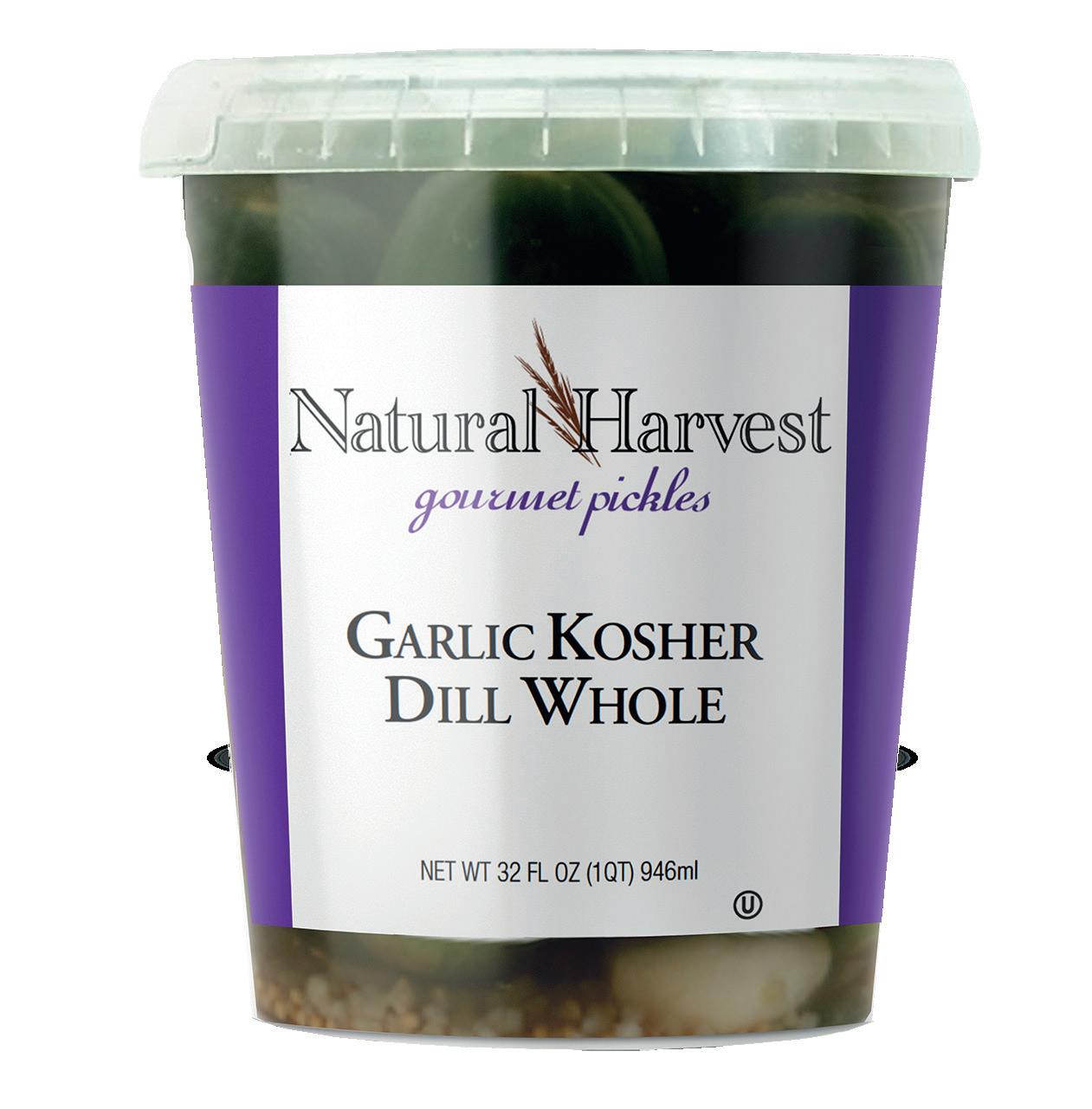

He then continues to discuss one additional contributor to the company’s success; one of which Bill is particularly proud. “My father used to remind us to treat people the way we want to be treated, and we carry that across our business. We actively value keeping everyone involved and motivated, and I believe that the best way to do that is by sharing the growth and celebrating every milestone.”
He shares that this ethos led Patriot Pickle to introduce a rewards scheme, which not only takes the form of monetary incentives, but prioritizes its
team spending time together. “We will pick an employee each week, and tell them to take their family out to dinner, send us the receipt, and we will gladly reimburse them. From my perspective, this job means that we take our people away from their families, so as a little reward back, we want to reinvest that time for them,” he expresses.
With these pillars in place to help keep the company robust against market volatility, we go on to discuss some of the challenges that Bill and his team face, following the impact of the pandemic. “None of us has been immune to the supply chain disruptions, and from my perspective, recruitment seems to be the biggest challenge at the moment. Both are affecting businesses in so many ways. To mitigate these obstacles, we are doing our best to ensure we are well-stocked. In terms of our supply chain issues, we don’t rely on one source of supply; in some instances, we triple source, which I think has worked well for our entire network.”
Tying in with the strategies in place to maintain the business’s success, Bill dives deeper into the ways Patriot Pickle is refining its company culture. He takes a moment to share that the business is also passionate about supporting work dedicated to helping those diagnosed with ALS, a progressive nervous system disease that affects nerve cells in the brain and spinal cord. “We promote and we give back to ALS annually. This company believes in contributing to something meaningful, and the fight against ALS is a cause we hold very dear.”
Now, Bill looks towards the remainder of 2022 with a clear plan that he believes will only push the company’s growth further.
.
. .new projects in development for the last quarter that will lead into 2023
“ “ “ “
“We are on a strong trajectory, and there are also some new projects in development for the last quarter that will lead into 2023. The plan is to maintain our growth, which has been very rapid over the last few years. We are also concentrating on customer support, employees and our vendor relationships, which will give us an even greater advantage.”
When Bill considers the future of the business five years from now, he envisions the company remaining true to its core values. This, he believes, will ensure it remains
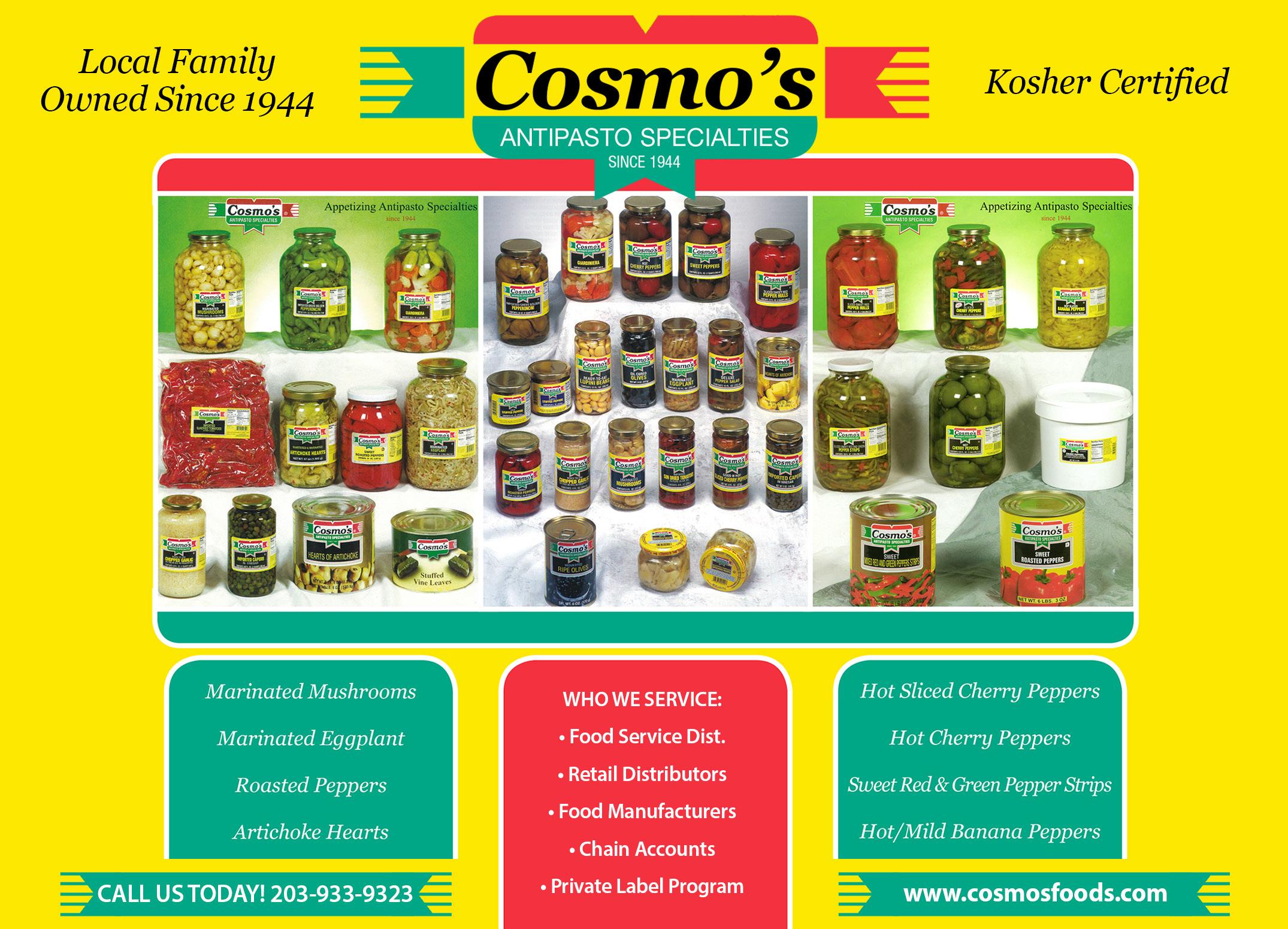
In 1944 Cosmo and Raffaela Laudano founded a small, wholesale grocery business in their home on Leete Street in West Haven, Connecticut. While Cosmo was out selling imported Italian food products, Raffaela answered the phone, kept the books and raised five children.
dedicated to the people and causes that lie at the heart of Patriot Pickle’s success. “We never want to lose sight of being the highest quality producer out there. However, the quality and culture of our business is really the most important aspect that we need to maintain. I know that growth will be a result of this, and that can only continue to strengthen as we progress.” ■
www.patriotpickle.comFrom a small mom and pop operation, the business outgrew its original location four times before arriving at its present home on Callegari Drive. The legacy passed down to their family by this hardworking couple still lives in the mission of Cosmo’s Food Products, Inc. to deliver the highest quality products with the best service to their many customers.
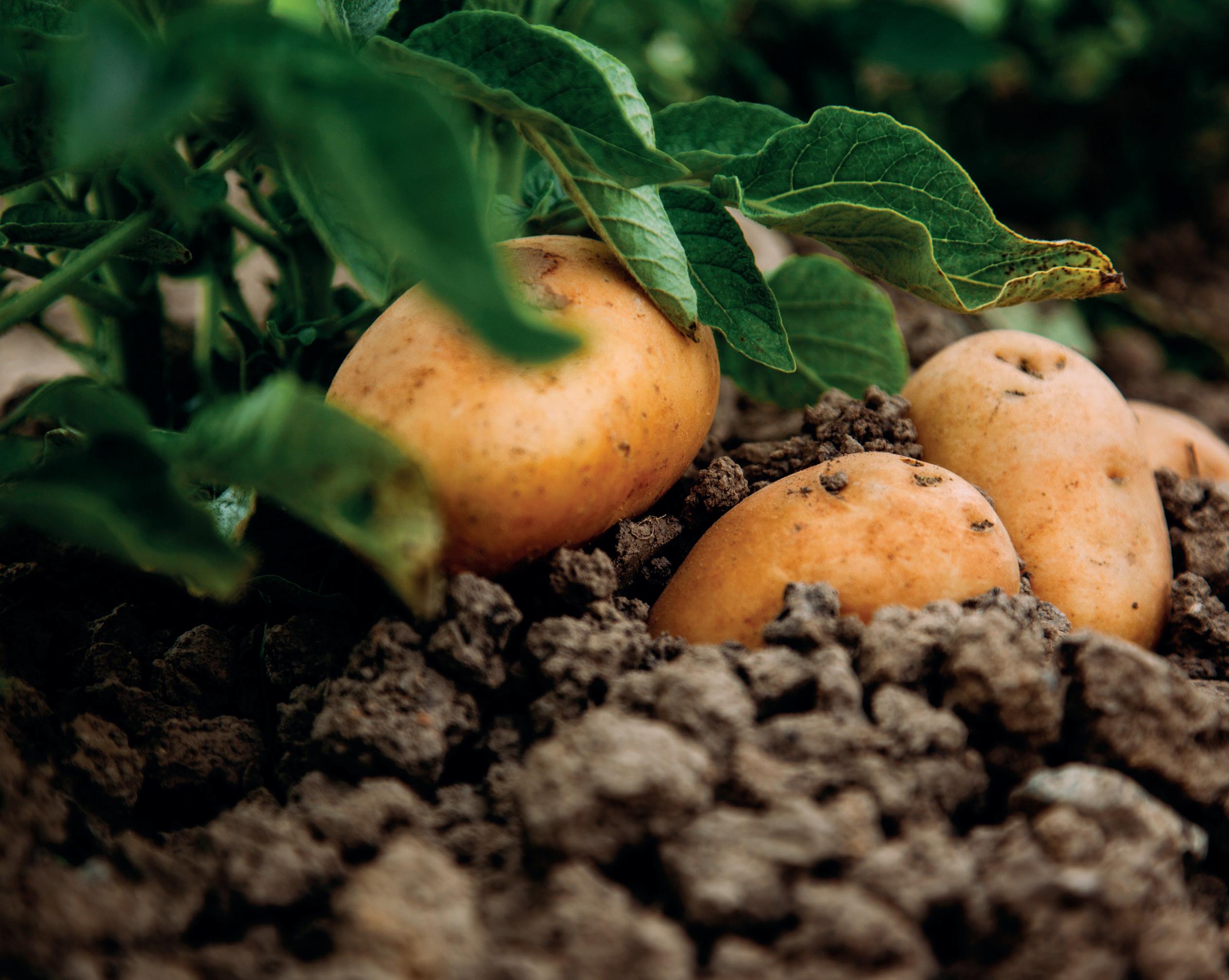
Internationally recognized as a leading potato grower, packer, and shipper, the name Allied Potato has become synonymous with superior quality and service. Exporting high quality chipstock, seed and table potatoes has become the company’s speciality, with thousands of tons exported every week to destinations in Canada, Mexico, Asia, Southeast Asia, Russia, the Caribbean, Brazil, Central and Northern Africa.
The seed for Allied Potato was planted in 2007 by Jason Davenport. His intention was to establish a successful company that specialized in the export of chipping potatoes from California and Washington. In 2009, the business expanded to include Brian Kirschenmann, a grower and packer from Bakersfield, California. With a similar vision for the future and a strong partnership built on respect and hard work, the
business quickly expanded to become a recognized leader in the potato industry.

As operations grew, Derek Davenport then joined the team in 2010, and is now a valued partner heading up the farm and packing operation in the heart of Washington’s potato growing community. Similar to the California operation, Allied Potato in the Northwest utilizes the latest technology and proprietary processes that ensure the quality, freshness and continuity of supply that customers have come to expect with each shipment. A few years later, in 2016, the company integrated a seed farm in Colorado.
As Food Chain discovers, expanding operations to various parts of California, Oregon, Washington, and Colorado has been one of the core ambitions of Allied Potato for many years, and the business is continuing to refine its operations to ensure that quality potatoes are delivered to customers across the globe.
From every owner boasting a family history of five generations of potato growers, to crossing into the millennium with fresh ideas and innovations, Allied Potato has remained true to its commitment to investing in the technology that helps customers achieve long-term stability and growth.
With strategic locations along the west of the US, Allied Potato has developed an innovative system for delivering large volumes of high-quality potatoes in the shortest amount of time. As the only grower of large volume chipping potatoes to offer consistent, reliable year-round supply chain solutions, its customers enjoy greater stability and flexibility for their own projections. Its diligent efforts in establishing
warehousing close enough to the ports of Long Beach, California, and Seattle, Washington has enabled it to export Allied potatoes to just about anywhere in the world.
In addition, the company handles its own international logistics to achieve a streamlined service that expedites the process. The modern business environment demands flexibility and the best logistics network available for rapidly evolving and growing markets. Allied Potato takes pride in supplying high
quality potatoes, in large volumes, while still maintaining the agility that customers require to meet the changing needs of their businesses.
There are two ways in which the company is guaranteeing the integrity of its supply chain. Firstly, through scheduled coordination. The company has a hand in the quality of every potato, working meticulously to ensure optimal planting conditions, fertility, and disease management, as well as monitoring crop maturity. It implements timely vine kill, and weed out varieties unsuitable for export, targeting accurate soil moisture levels for vine kill and harvest.
Secondly, every country requires different documentation to receive international shipments. Allied
Potato ensures that all shipping documents are processed correctly for the timely and efficient release of cargo in the receiving country.
Through strategic coordination with USDA inspectors, port authorities, growers and packers, truckers, shipping lines, forwarding agents, customs agents, and customers, the company ensures the proper flow and tracking of all documents to meet the timely delivery and clearance of goods ordered.
Although growing its international network is a key part of the company’s operation, Allied Potato is also passionate about strengthening relations with its people and its community. This is why it devotes time, money, and resources to giving back to its community. The company lends its support to many worthy causes that enrich the lives of children, and help them to thrive.
One such way in which it supports its local communities is through planting gardens. In 2017, Allied Potato Colorado planted its third annual pumpkin patch. It was designed to give children and their families a fun activity, sense of support, and a small appreciation for agriculture. Crops are typically ready in late September, providing the business with an opportunity to give school groups and other organizations a chance to enjoy the patch. After schools and community organizations have picked their free pumpkins, Allied Potato then opens the patch up to the public and invites them to pick a pumpkin, and enjoy some time in the patch with their family and friends.
The reception for this initiative has been encouraging. The company is excited to report that the patch has had visitors from as far away as 100 miles, and, in a single year, it gave away more than 10,000 pumpkins and welcomed approximately 3000 people.
In addition to the pumpkin patch, the company has taken on several other initiatives. For Allied Potato, hard work, and reaping the rewards of a job well done is a core motivation for the business, which is why it also supports an organization that upholds similar values, promotes volunteerism, and is instrumental in molding young men into proud members of its community. As well as helping sponsor Eagle Scout Projects with donations of time, labor, money and other necessary resources, the company enjoys teaching the local boy scouts new skills, such as how to safely use farm equipment like saws, welding equipment and drills,
or how to properly tie down equipment for transport. One Eagle project involved planting a garden in an elementary school so students could learn how to successfully grow and cultivate herbs and vegetables, develop an appreciation for plant life, and learn about sustainable gardening.
With a passion for community and a determination to bring its produce to the world, Allied Potato is a name to be trusted. We will be keeping a close eye on the company’s developments as it continues to advocate for growth both within the business, and across international borders. ■








Our partnership with Allied Potato has been both an exciting and rewarding journey. Their passion and generosity in sharing their extensive knowledge of potato production and industry allowed us to contribute to their growth as a valued supplier of their Chipperbec.
Gosselin G2 is a family-owned company that has been growing potatoes since 1960. Alongside providing potato chip manufacturers with the best possible product all year-round, we also offer a range of services that ensure the supply chain is trouble-free, and guarantee unmatched peace of mind.









Our quality guarantee is made possible by our integrated business model. Gosselin G2 sustainable approach is built on sound soil ecosystems and respect for the environment and aims to take advantage of the health of our soils, which all our actions are designed to improve.

To Allied Potato, congratulations on all your achievements. You are an exceptional partner, and truly live by your name as an outstanding business with which to work.





Thank you for your trust and constant support.www.alliedpotato.com


